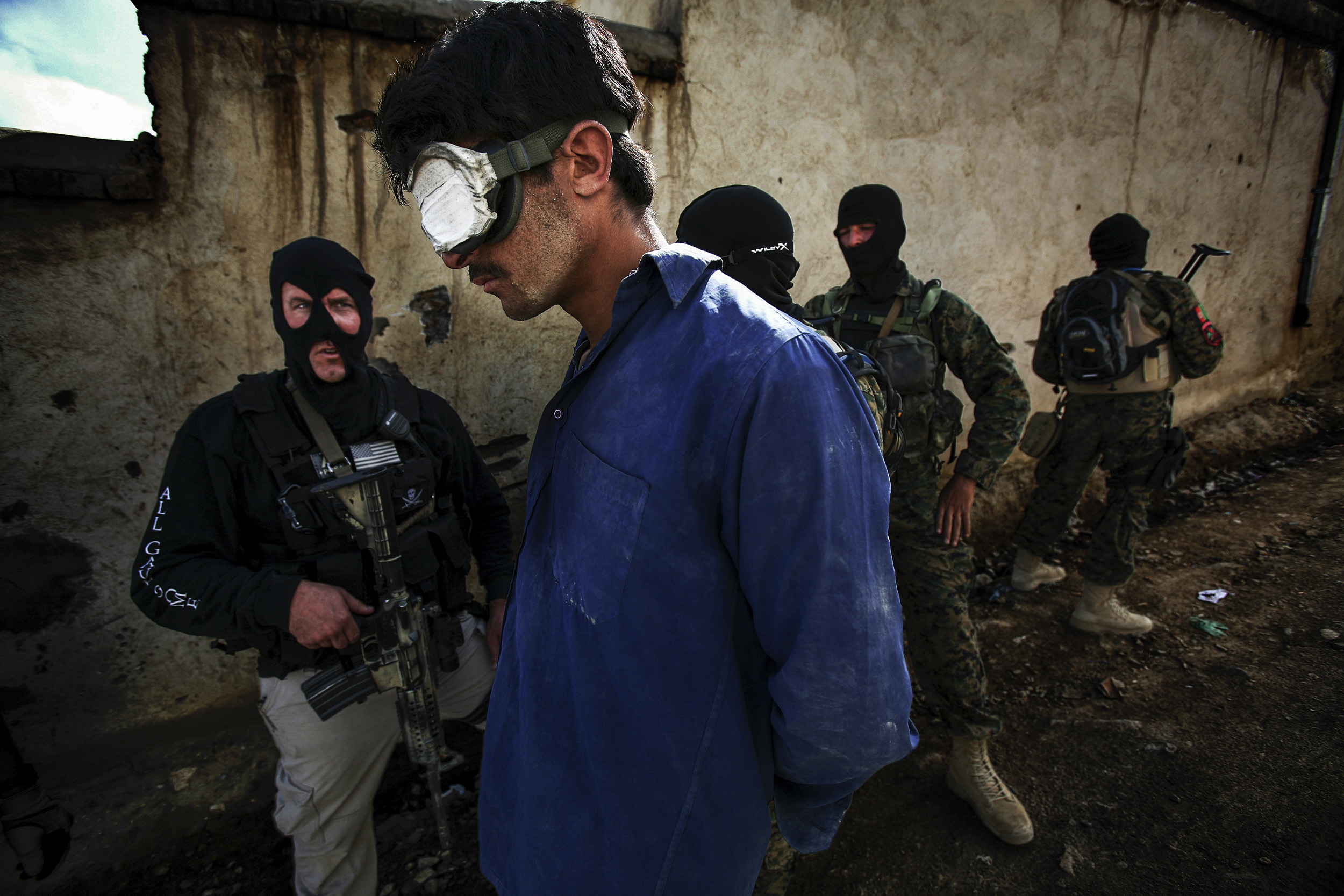
KABUL, AFGHANISTAN-APRIL 2007: Scenes from a drugs bust conducted by the Afghan Anti-Narcotics unit assisted by American DEA agents who have been training these men for over 2 years, Kabul, Afghanistan, 18 April 2007. The images show a search scene and arrest with 2 suspects in custody. 6 kilos of processed heroin was confiscated in the raid. Afghanistan currently produces over 90% of the world's illegal opium and the industry accounts for over 45% of the countries annual GDP. A great deal of this production is based on communal poverty and a lack of alternatives for farmers combined with coercion from the opium cartels of Afghanistan and Pakistan. The event is filmed by CNN freelance crew Cameraman Richard Parry and producer Tresha Mabile. (Photo by Brent Stirton/Getty Images.)
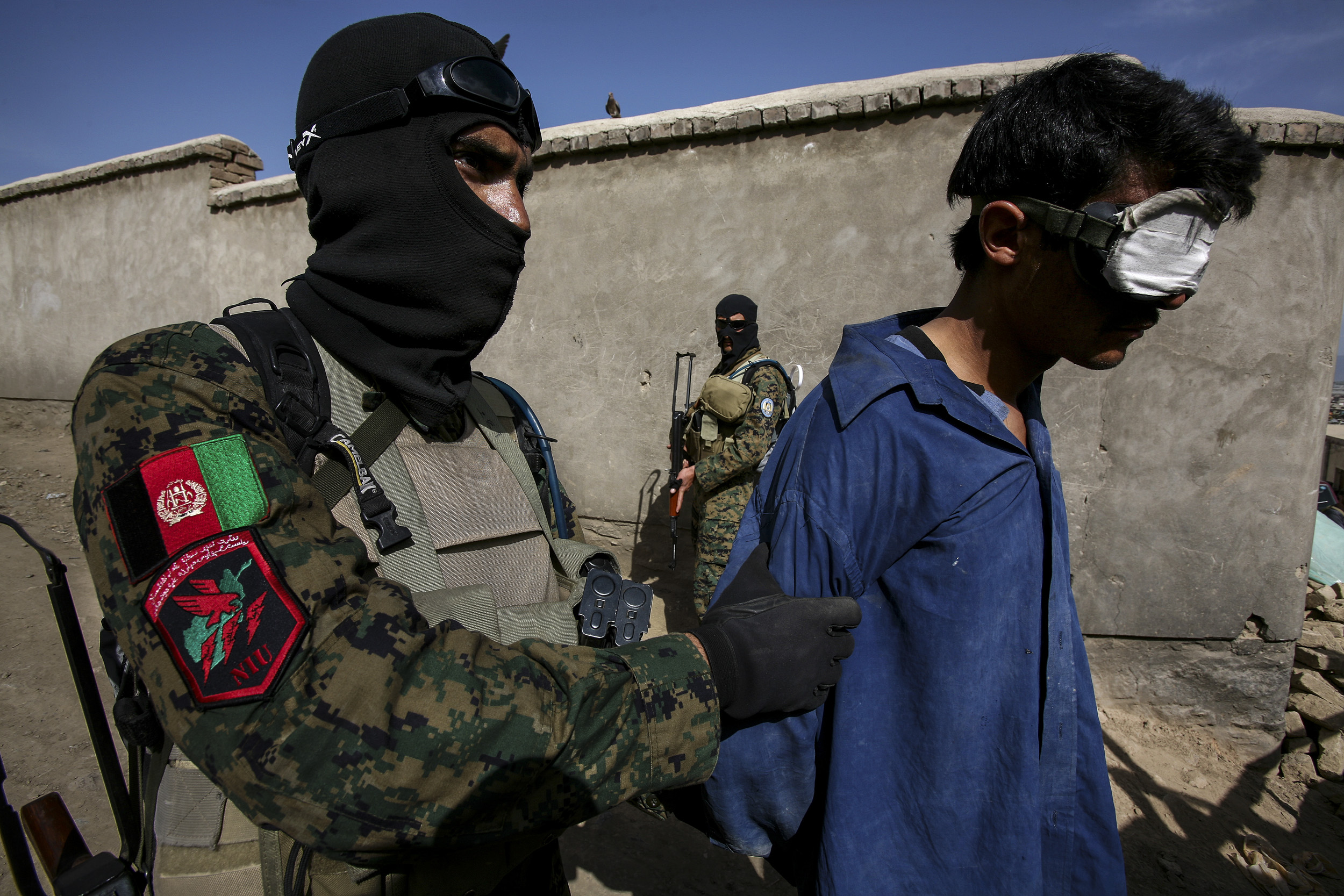
KABUL, AFGHANISTAN-APRIL 2007: Scenes from a drugs bust conducted by the Afghan Anti-Narcotics unit assisted by American DEA agents who have been training these men for over 2 years, Kabul, Afghanistan, 18 April 2007. The images show a search scene and arrest with 2 suspects in custody. 6 kilos of processed heroin was confiscated in the raid. Afghanistan currently produces over 90% of the world's illegal opium and the industry accounts for over 45% of the countries annual GDP. A great deal of this production is based on communal poverty and a lack of alternatives for farmers combined with coercion from the opium cartels of Afghanistan and Pakistan. The event is filmed by CNN freelance crew Cameraman Richard Parry and producer Tresha Mabile. (Photo by Brent Stirton/Getty Images.)
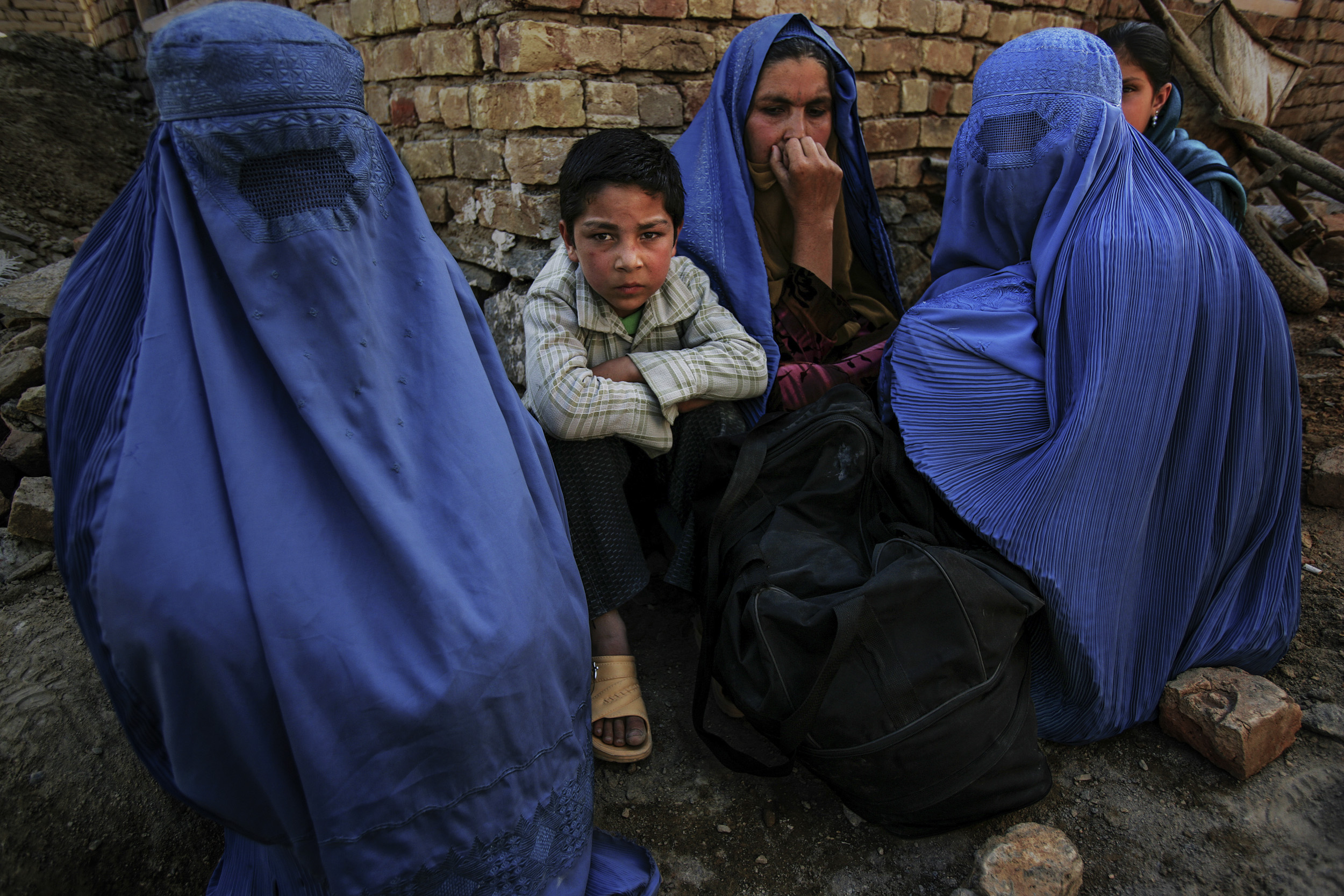
KABUL, AFGHANISTAN-APRIL 2007: Scenes from a drugs bust conducted by the Afghan Anti-Narcotics unit assisted by American DEA agents who have been training these men for over 2 years, Kabul, Afghanistan, 18 April 2007. The images show a search scene and arrest with 2 suspects in custody. 6 kilos of processed heroin was confiscated in the raid. Afghanistan currently produces over 90% of the world's illegal opium and the industry accounts for over 45% of the countries annual GDP. A great deal of this production is based on communal poverty and a lack of alternatives for farmers combined with coercion from the opium cartels of Afghanistan and Pakistan. The event is filmed by CNN freelance crew Cameraman Richard Parry and producer Tresha Mabile. (Photo by Brent Stirton/Getty Images.)
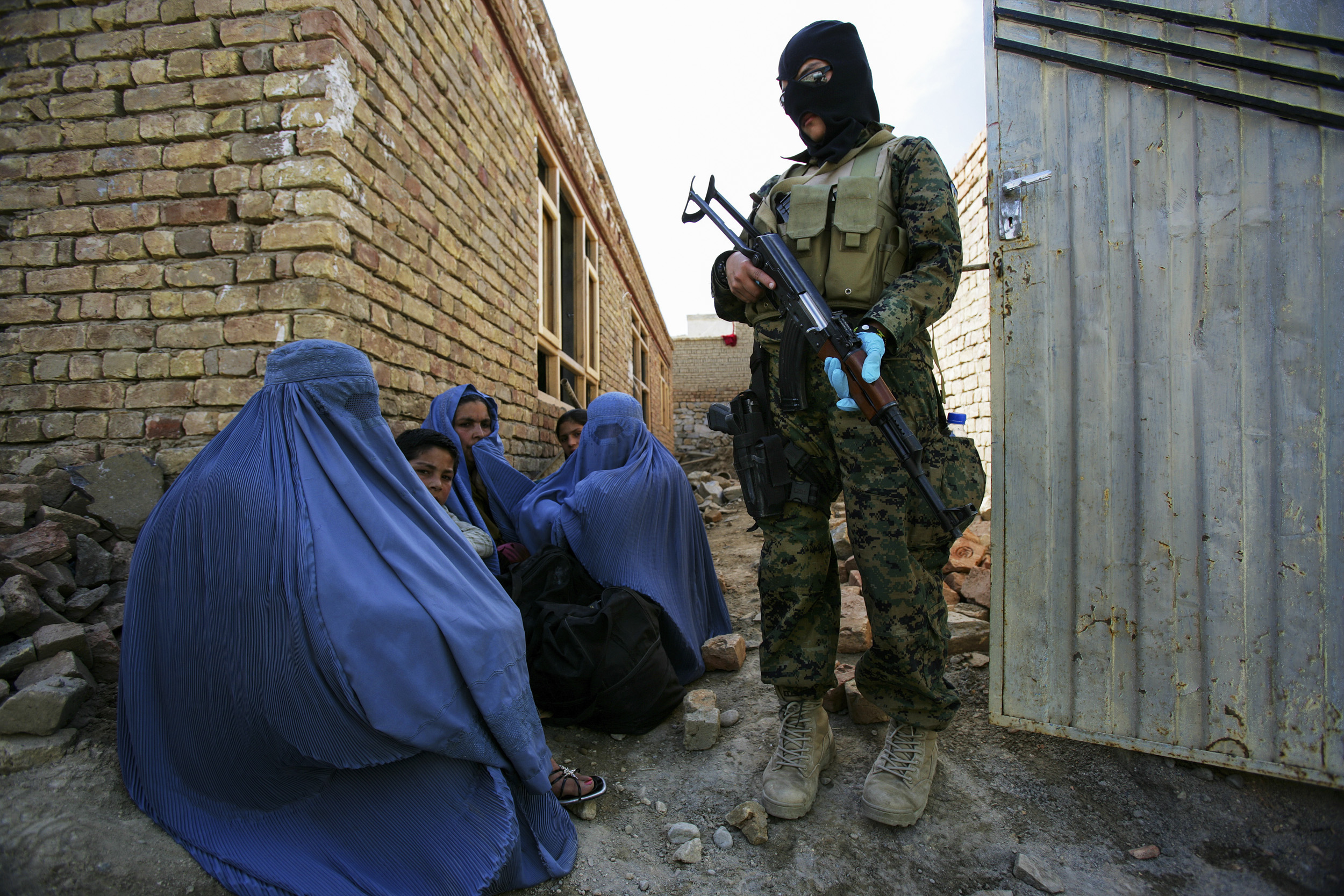
KABUL, AFGHANISTAN-APRIL 2007: Scenes from a drugs bust conducted by the Afghan Anti-Narcotics unit assisted by American DEA agents who have been training these men for over 2 years, Kabul, Afghanistan, 18 April 2007. The images show a search scene and arrest with 2 suspects in custody. 6 kilos of processed heroin was confiscated in the raid. Afghanistan currently produces over 90% of the world's illegal opium and the industry accounts for over 45% of the countries annual GDP. A great deal of this production is based on communal poverty and a lack of alternatives for farmers combined with coercion from the opium cartels of Afghanistan and Pakistan. The event is filmed by CNN freelance crew Cameraman Richard Parry and producer Tresha Mabile. (Photo by Brent Stirton/Getty Images.)
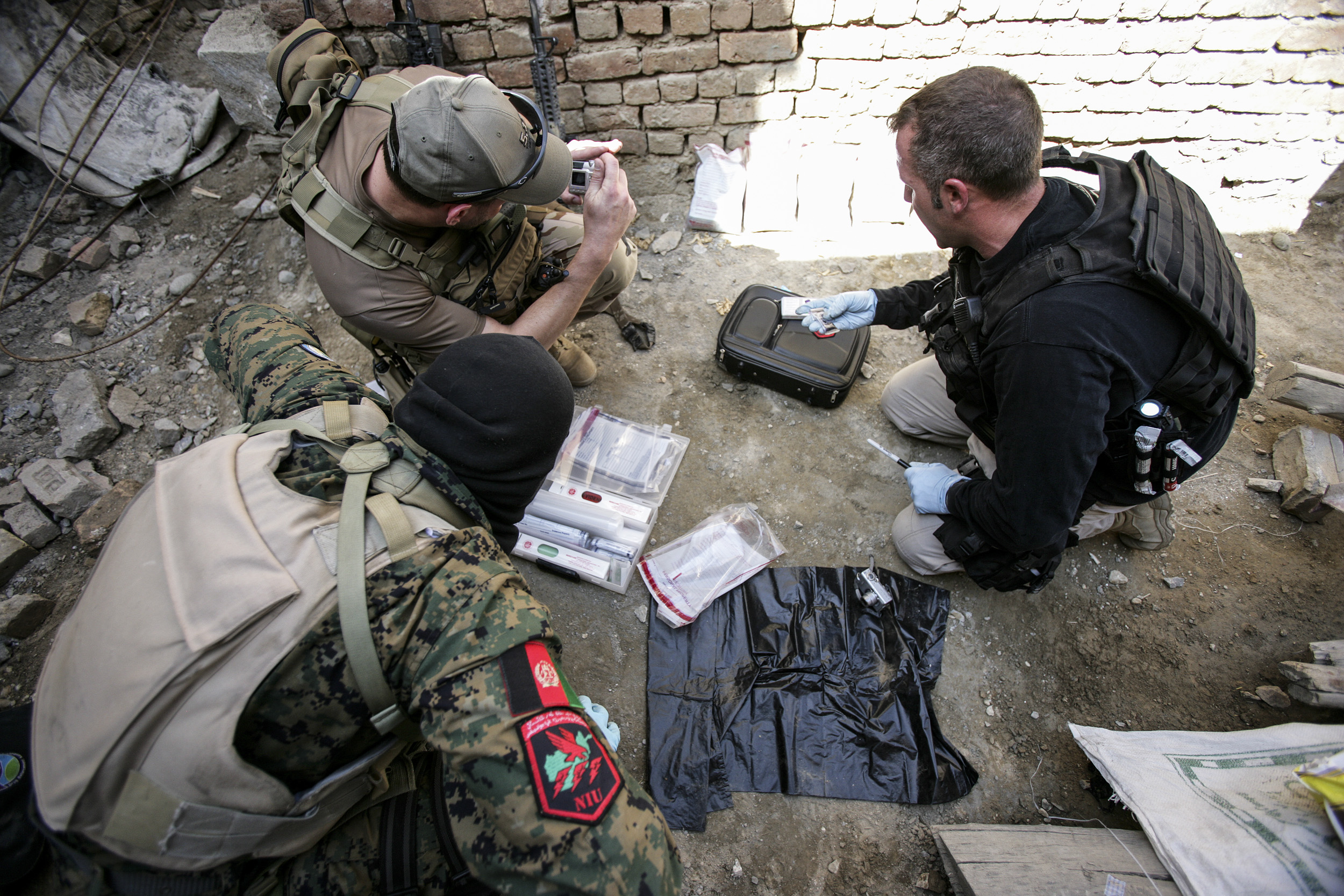
KABUL, AFGHANISTAN-APRIL 2007: Scenes from a drugs bust conducted by the Afghan Anti-Narcotics unit assisted by American DEA agents who have been training these men for over 2 years, Kabul, Afghanistan, 18 April 2007. The images show a search scene and arrest with 2 suspects in custody. 6 kilos of processed heroin was confiscated in the raid. Afghanistan currently produces over 90% of the world's illegal opium and the industry accounts for over 45% of the countries annual GDP. A great deal of this production is based on communal poverty and a lack of alternatives for farmers combined with coercion from the opium cartels of Afghanistan and Pakistan. The event is filmed by CNN freelance crew Cameraman Richard Parry and producer Tresha Mabile. (Photo by Brent Stirton/Getty Images.)
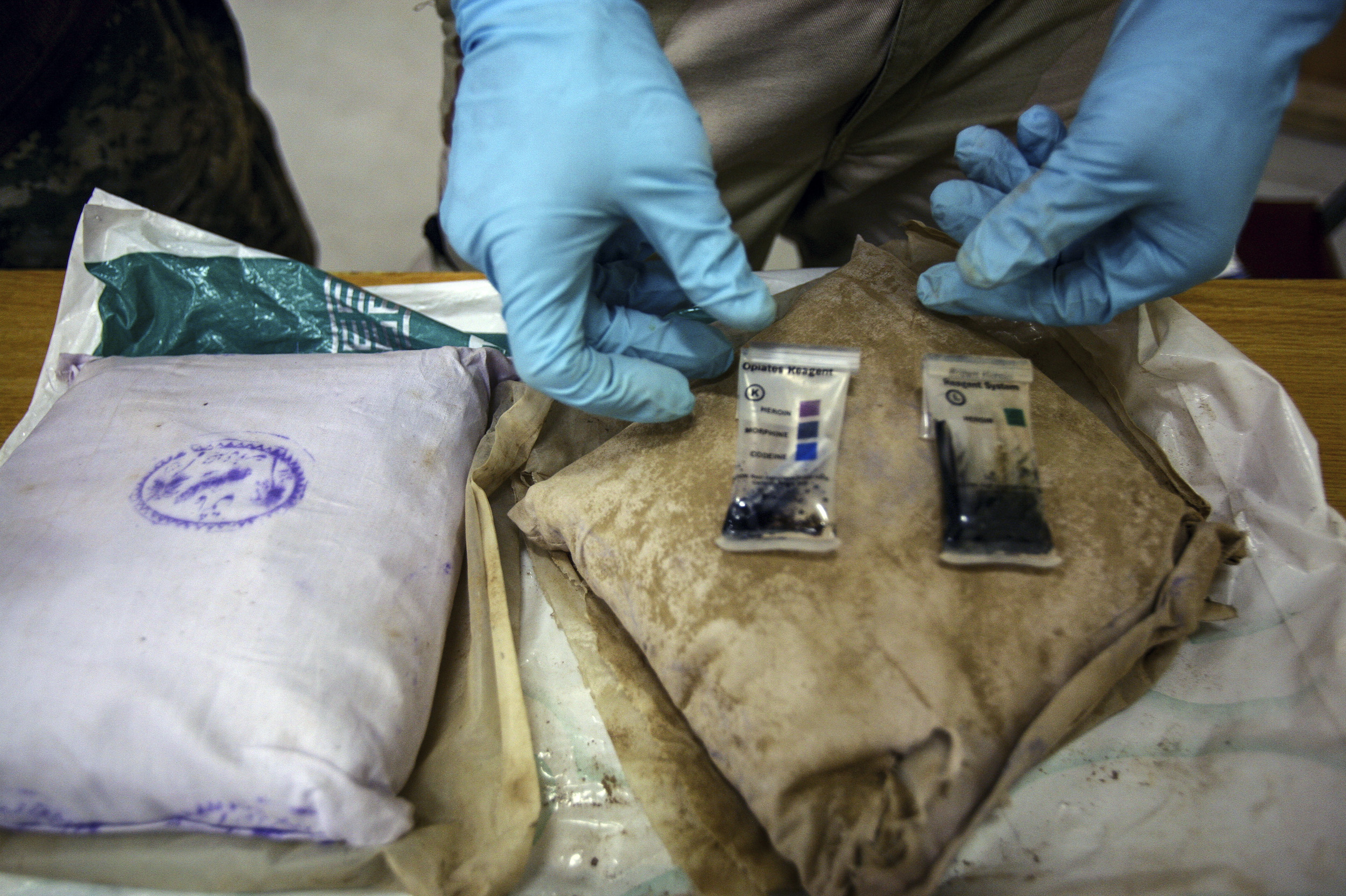
KABUL, AFGHANISTAN-APRIL 2007: Scenes from a drugs bust conducted by the Afghan Anti-Narcotics unit assisted by American DEA agents who have been training these men for over 2 years, Kabul, Afghanistan, 18 April 2007. The images show a search scene and arrest with 2 suspects in custody. 6 kilos of processed heroin was confiscated in the raid. Afghanistan currently produces over 90% of the world's illegal opium and the industry accounts for over 45% of the countries annual GDP. A great deal of this production is based on communal poverty and a lack of alternatives for farmers combined with coercion from the opium cartels of Afghanistan and Pakistan. The event is filmed by CNN freelance crew Cameraman Richard Parry and producer Tresha Mabile. (Photo by Brent Stirton/Getty Images.)
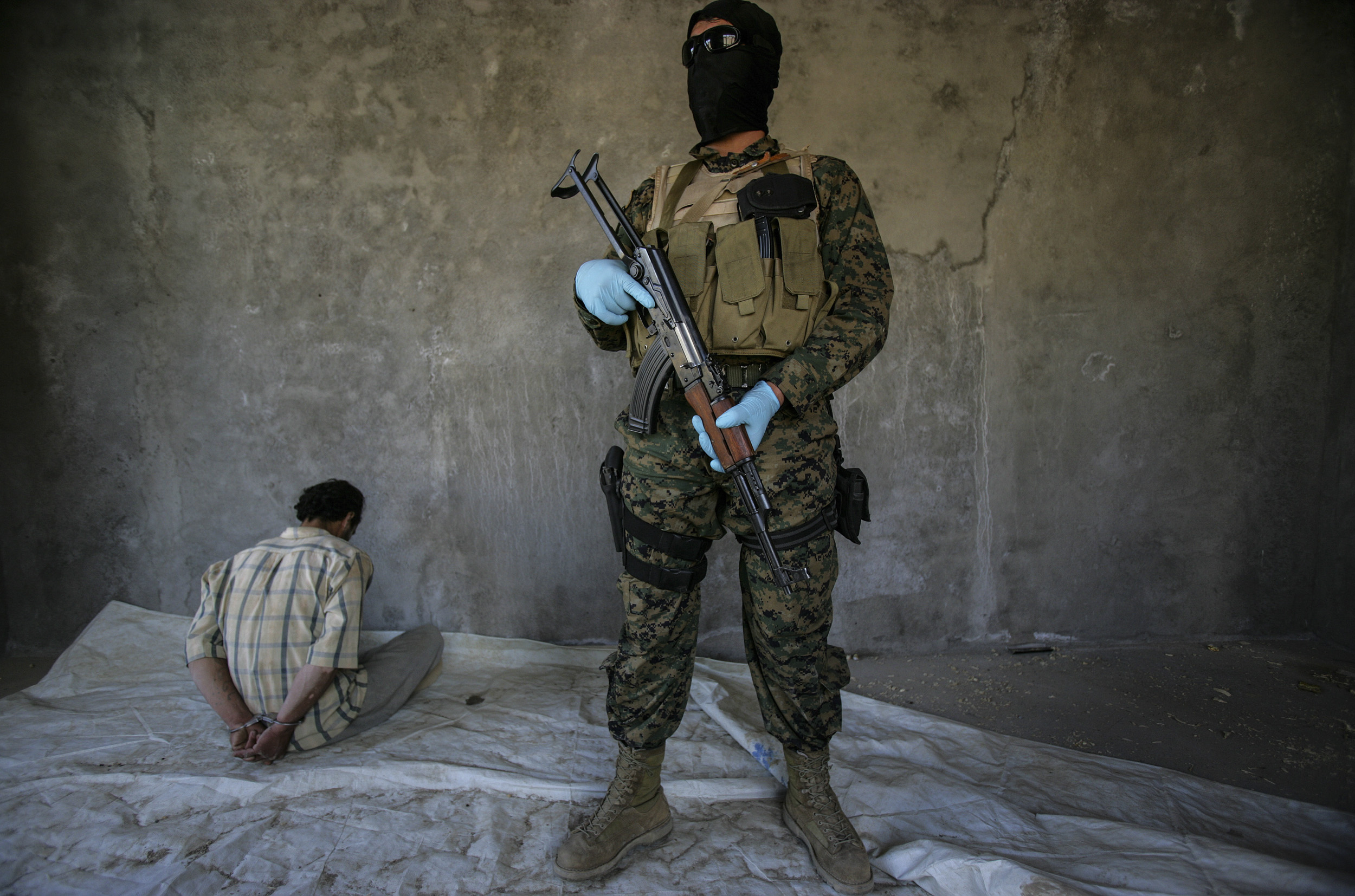
KABUL, AFGHANISTAN-APRIL 2007: Scenes from a drugs bust conducted by the Afghan Anti-Narcotics unit assisted by American DEA agents who have been training these men for over 2 years, Kabul, Afghanistan, 18 April 2007. The images show a search scene and arrest with 2 suspects in custody. 6 kilos of processed heroin was confiscated in the raid. Afghanistan currently produces over 90% of the world's illegal opium and the industry accounts for over 45% of the countries annual GDP. A great deal of this production is based on communal poverty and a lack of alternatives for farmers combined with coercion from the opium cartels of Afghanistan and Pakistan. The event is filmed by CNN freelance crew Cameraman Richard Parry and producer Tresha Mabile. (Photo by Brent Stirton/Getty Images.)
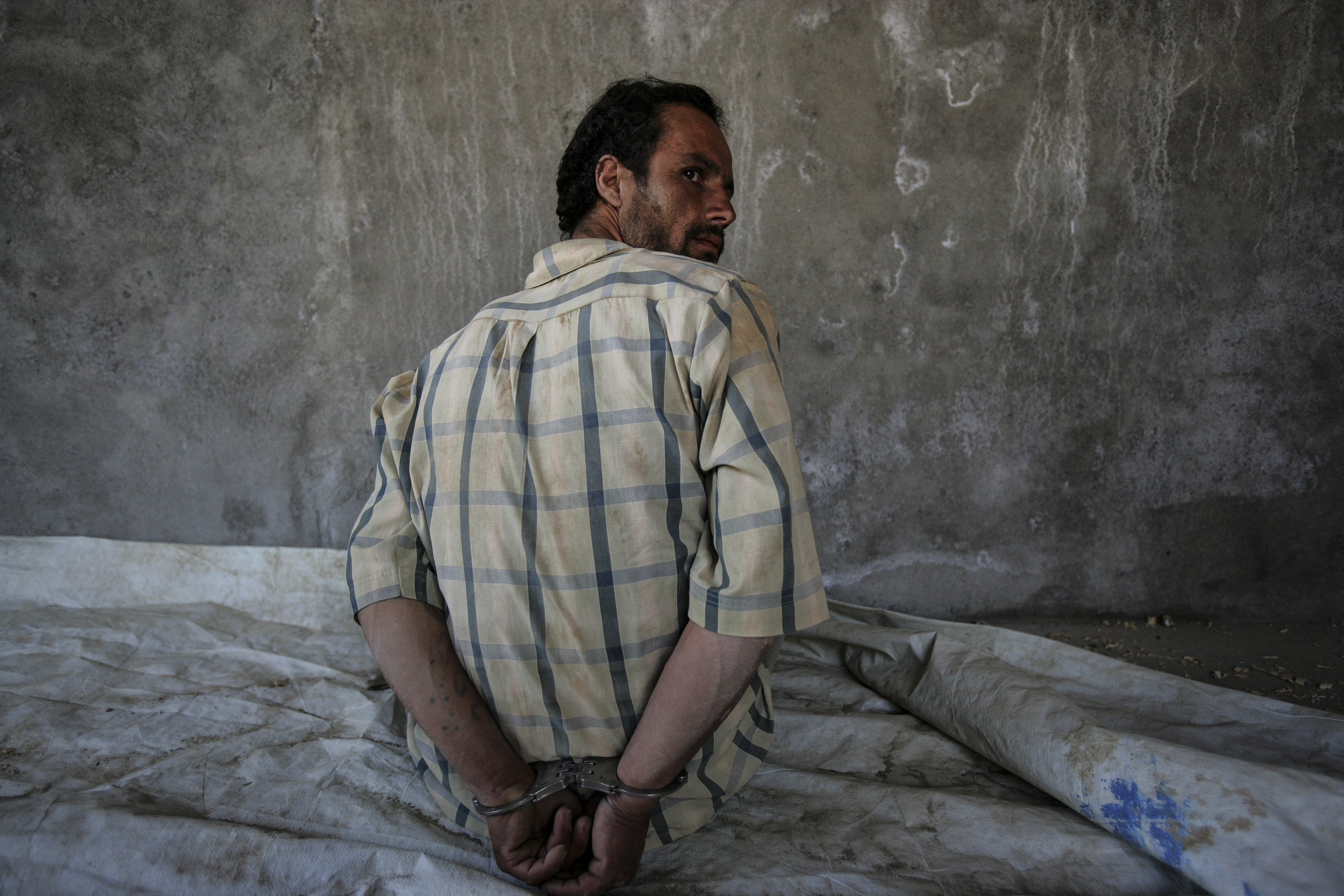
KABUL, AFGHANISTAN-APRIL 2007: Scenes from a drugs bust conducted by the Afghan Anti-Narcotics unit assisted by American DEA agents who have been training these men for over 2 years, Kabul, Afghanistan, 18 April 2007. The images show a search scene and arrest with 2 suspects in custody. 6 kilos of processed heroin was confiscated in the raid. Afghanistan currently produces over 90% of the world's illegal opium and the industry accounts for over 45% of the countries annual GDP. A great deal of this production is based on communal poverty and a lack of alternatives for farmers combined with coercion from the opium cartels of Afghanistan and Pakistan. The event is filmed by CNN freelance crew Cameraman Richard Parry and producer Tresha Mabile. (Photo by Brent Stirton/Getty Images.)
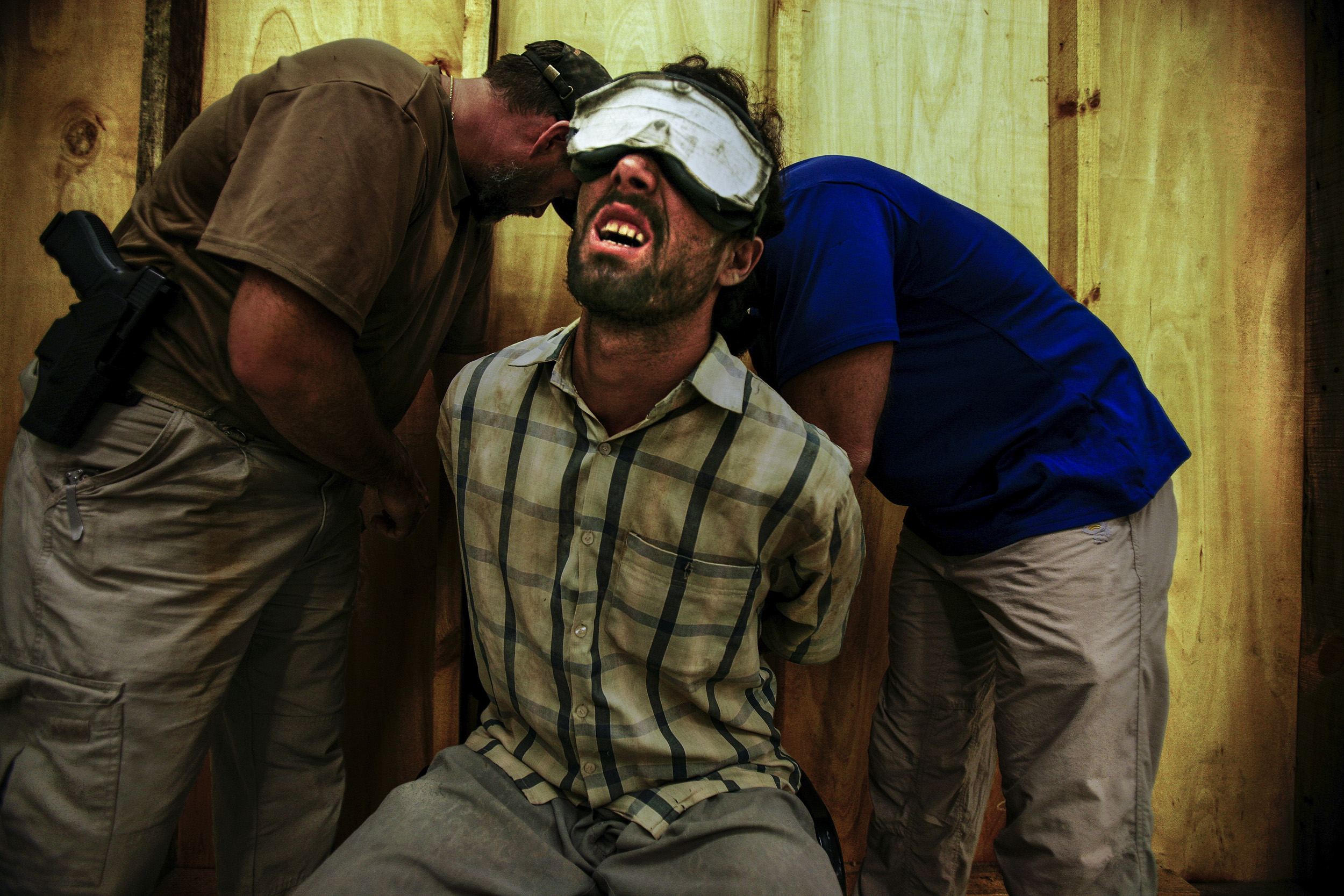
KABUL, AFGHANISTAN-APRIL 2007: Scenes from a drugs bust conducted by the Afghan Anti-Narcotics unit assisted by American DEA agents who have been training these men for over 2 years, Kabul, Afghanistan, 18 April 2007. The images show a search scene and arrest with 2 suspects in custody. 6 kilos of processed heroin was confiscated in the raid. Afghanistan currently produces over 90% of the world's illegal opium and the industry accounts for over 45% of the countries annual GDP. A great deal of this production is based on communal poverty and a lack of alternatives for farmers combined with coercion from the opium cartels of Afghanistan and Pakistan. The event is filmed by CNN freelance crew Cameraman Richard Parry and producer Tresha Mabile. (Photo by Brent Stirton/Getty Images.)
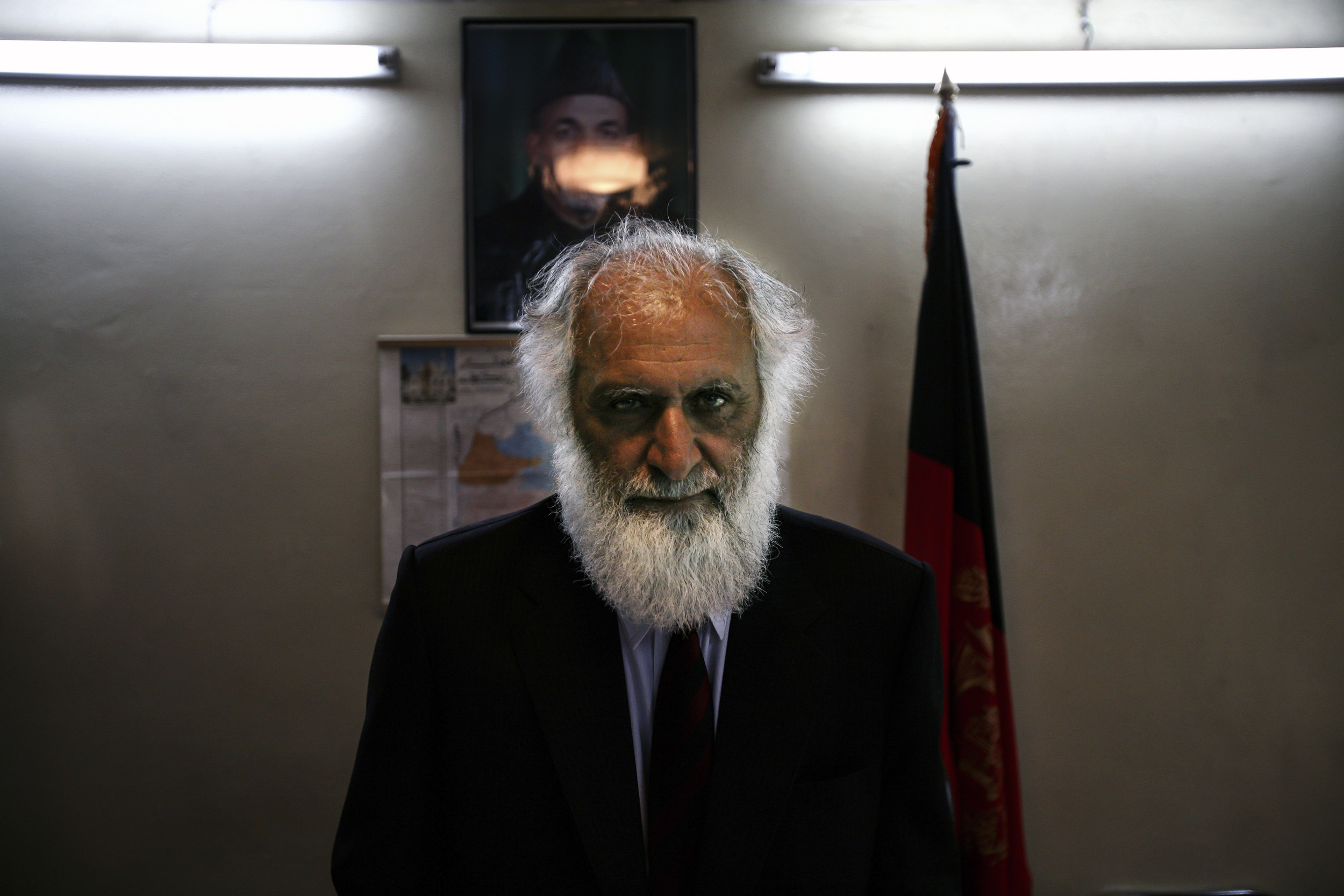
KABUL, AFGHANISTAN-APRIL 2007: Scenes from the office of the Attorney General of Afghanistan, a man who has vowed a war against corruption in the troubled country, Kabul Afghanistan, 16 April 2007. CNN Senior international correspondent Anderson Cooper interviews the Attorney General for a show on the drug war taking place in Afghanistan today. (Photo by Brent Stirton/Getty Images.)
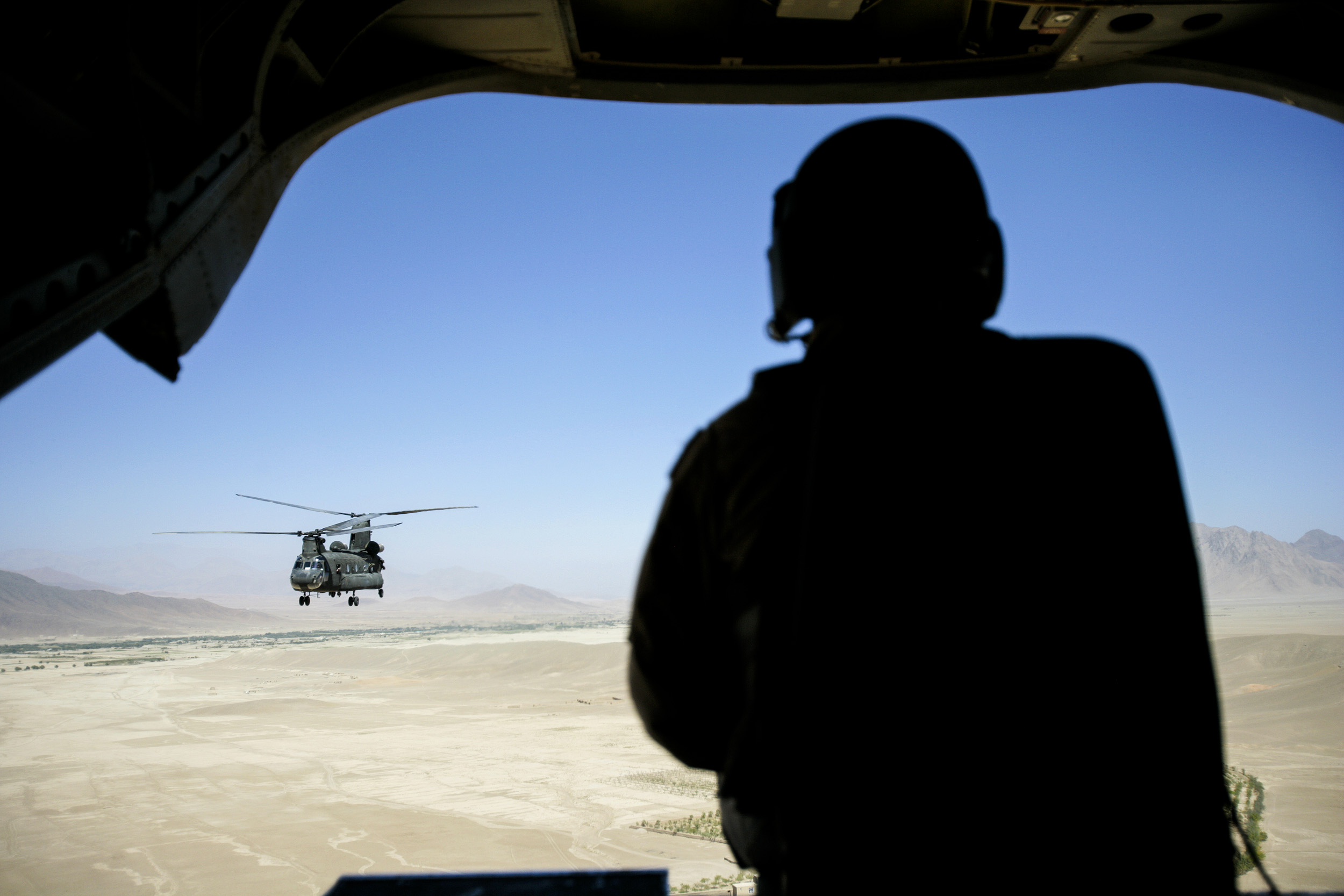
Kabul, Afghanistan, September 11, 2006: CNN Anchor Anderson Cooper, Field producer Charlie Moore, Photojournalist Phillip Littleton and Senior International Correspondent Nic Robertson, Senior Producer Henry Schuster and photojournalist Todd Baxter fly to US foward operating base Bermel in the Paktika Province in Afghanistan. The CNN crews shot the 9/11 anniversary at the base. Photo by Brent Stirton/Getty Images
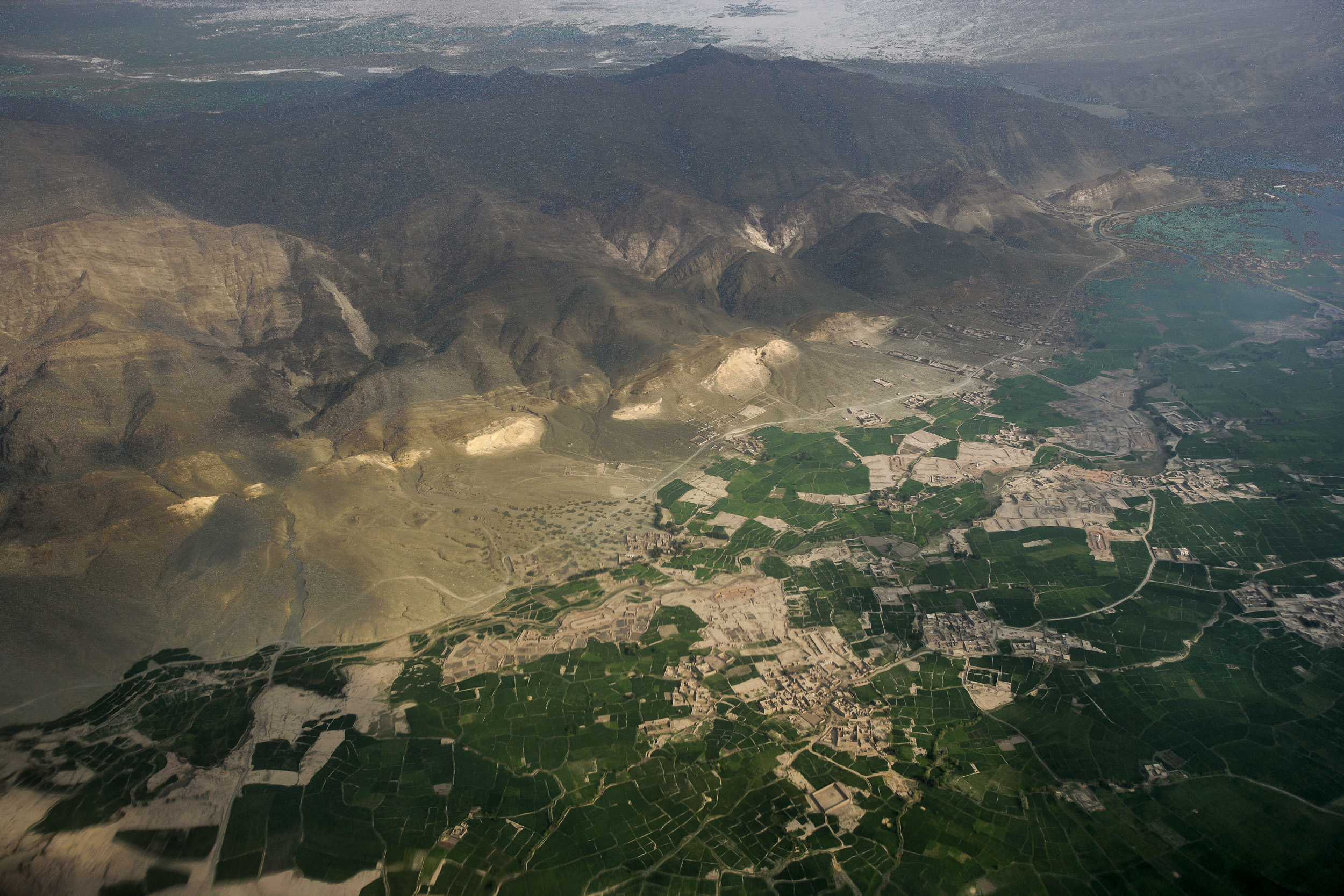
Kabul/Jalalabad, Afghanistan 10-16 March 2006: CNN's Chief International Correspondent Christiane Amanpour and CNN's terrorism expert Peter Bergen track Osama Bin Laden as they interview various subjects who knew Bin Laden during his time in Afghanistan. CNN visited his former home in Kabul as well as his bombed out compound near the city of Jalalabad. CNN spoke with former front line commanders from the battles of Tora Bora as well as the governor of Kabul and others who encountered Bin Laden. Amanpour and Bergen were accompanied on this trip by CNN cameraman Mark Phillips, Field Producer Piere Bairin, Senior Producer Ken Shiffman and Producer/ Editor Cliff Hackel. *** Local Caption *** CNN
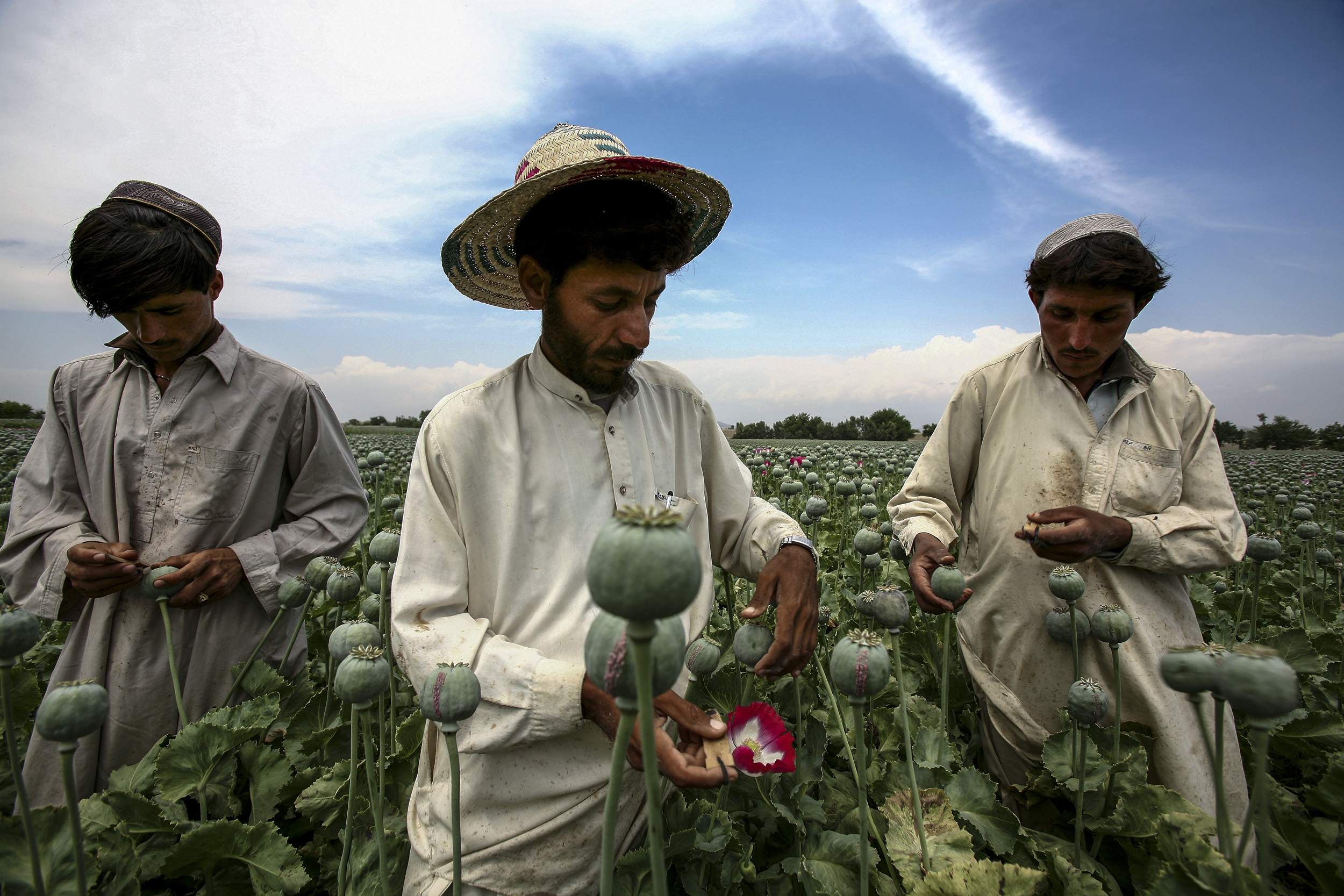
JALALABAD, AFGHANISTAN-APRIL 2007: Images from illegal opium producing poppy farms an hours travel outside of Jalalabad, Afghanistan, 19 April 2007. Afghanistan currently produces over 90% of the world's illegal opium and the industry accounts for over 45% of the countries annual GDP. A great deal of this production is based on communal poverty and a lack of alternatives for farmers combined with coercion from the opium cartels of Afghanistan and Pakistan. The event is filmed by CNN freelance crew Cameraman Richard Parry and producer Tresha Mabile. (Photo by Brent Stirton/Getty Images.)
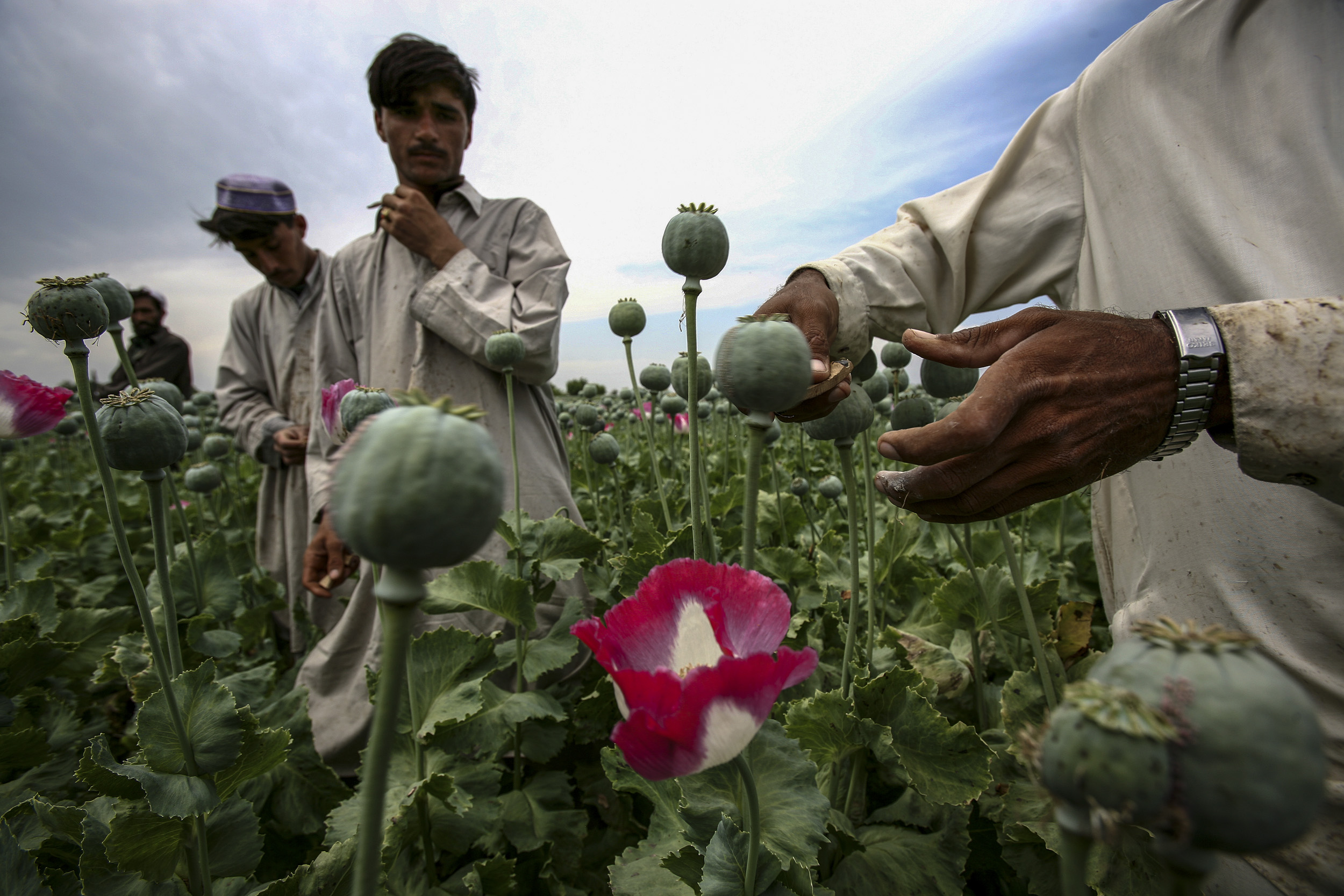
JALALABAD, AFGHANISTAN-APRIL 2007: Images from illegal opium producing poppy farms an hours travel outside of Jalalabad, Afghanistan, 19 April 2007. Afghanistan currently produces over 90% of the world's illegal opium and the industry accounts for over 45% of the countries annual GDP. A great deal of this production is based on communal poverty and a lack of alternatives for farmers combined with coercion from the opium cartels of Afghanistan and Pakistan. The event is filmed by CNN freelance crew Cameraman Richard Parry and producer Tresha Mabile. (Photo by Brent Stirton/Getty Images.)
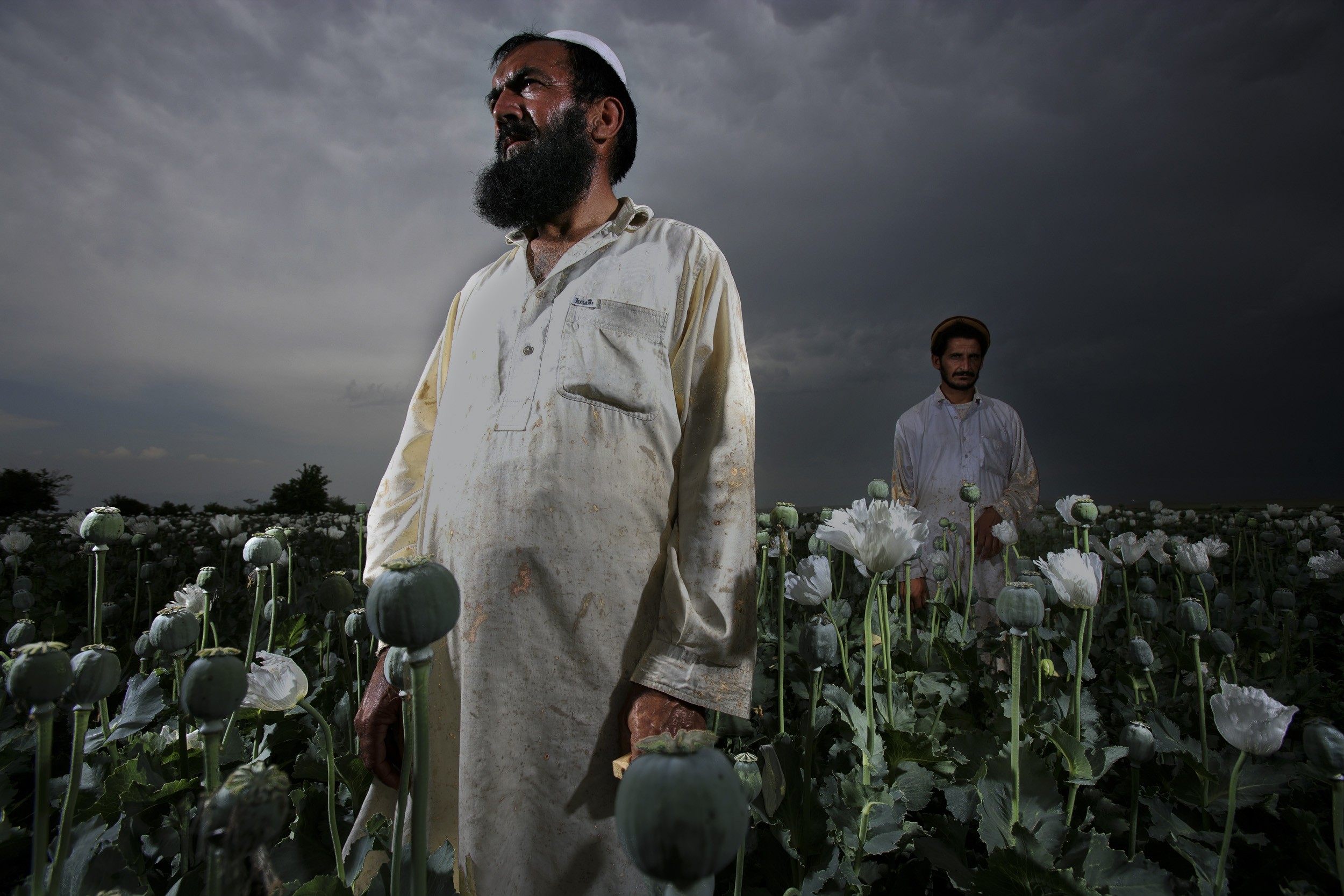
JALALABAD, AFGHANISTAN-APRIL 2007: Images from illegal opium producing poppy farms an hours travel outside of Jalalabad, Afghanistan, 19 April 2007. Afghanistan currently produces over 90% of the world's illegal opium and the industry accounts for over 45% of the countries annual GDP. A great deal of this production is based on communal poverty and a lack of alternatives for farmers combined with coercion from the opium cartels of Afghanistan and Pakistan. The event is filmed by CNN freelance crew Cameraman Richard Parry and producer Tresha Mabile. (Photo by Brent Stirton/Getty Images.)
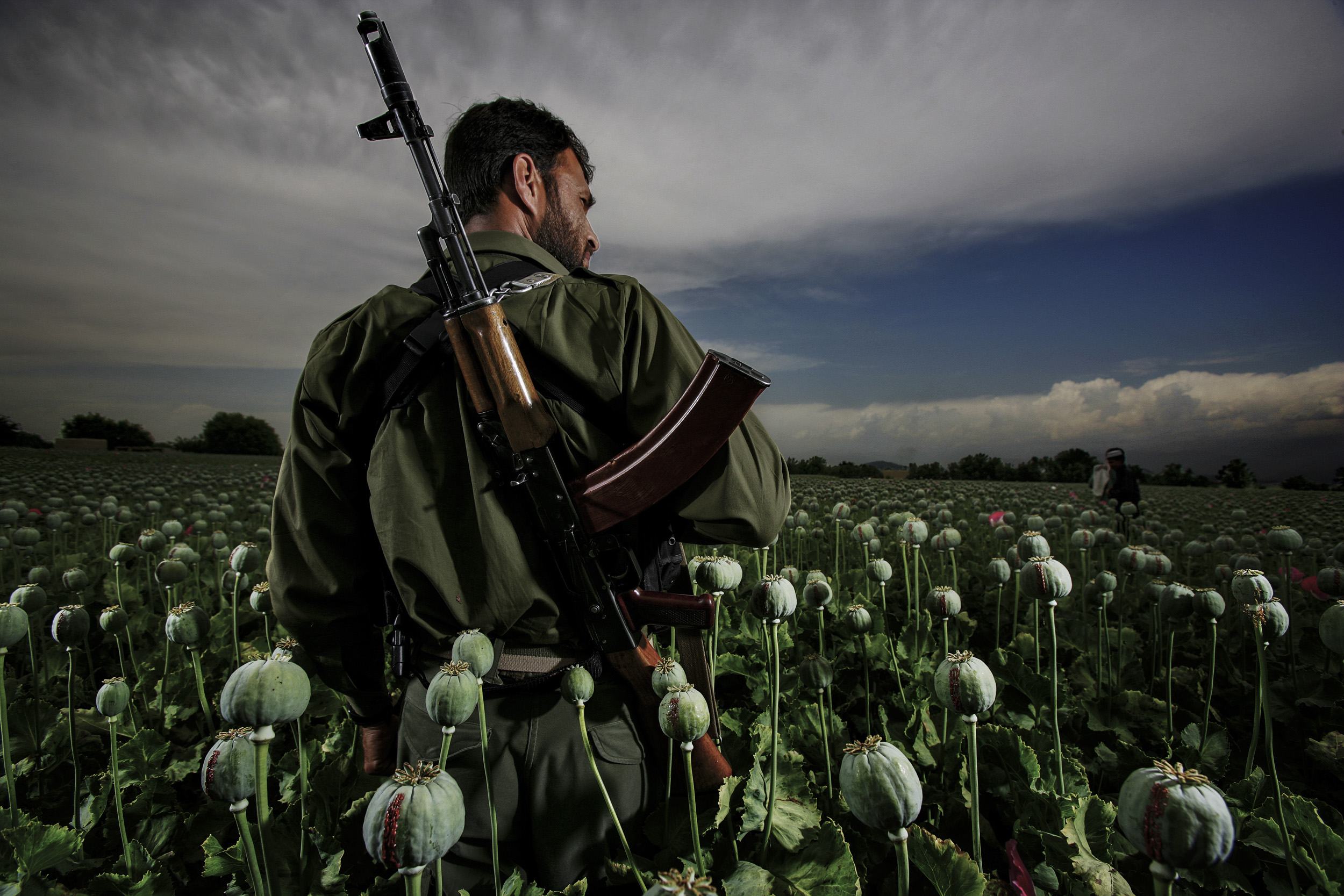
JALALABAD, AFGHANISTAN-APRIL 2007: Images from illegal opium producing poppy farms an hours travel outside of Jalalabad, Afghanistan, 19 April 2007. Afghanistan currently produces over 90% of the world's illegal opium and the industry accounts for over 45% of the countries annual GDP. A great deal of this production is based on communal poverty and a lack of alternatives for farmers combined with coercion from the opium cartels of Afghanistan and Pakistan. The event is filmed by CNN freelance crew Cameraman Richard Parry and producer Tresha Mabile. (Photo by Brent Stirton/Getty Images.)
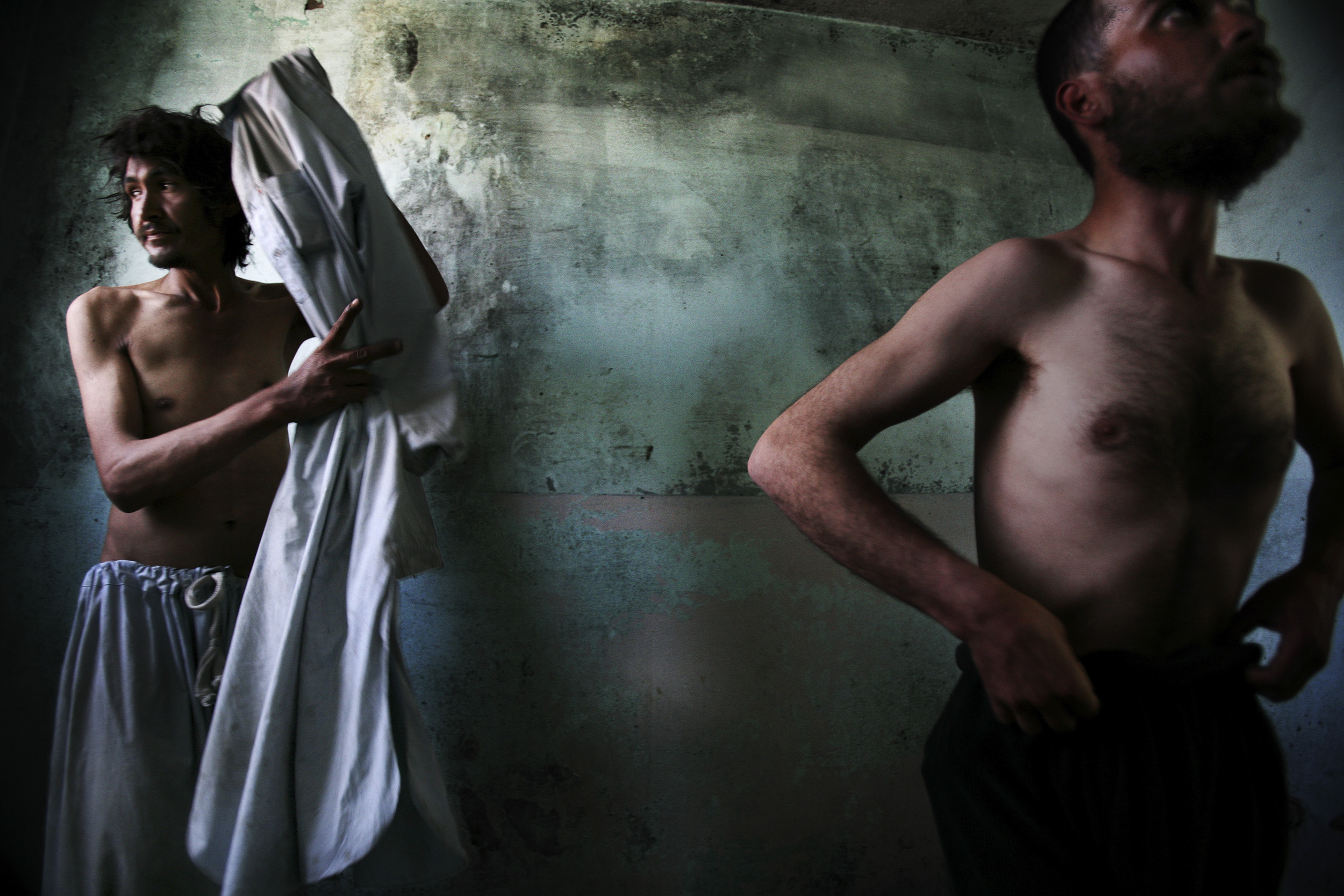
KABUL, AFGHANISTAN-APRIL 2007: Scenes with drug addicts at an underfunded rehabilitation centre and at the place where they use drugs, Kabul Afghanistan, 16 April 2007. CNN Senior international correspondent Anderson Cooper interviews addicts for a show on the drug war taking place in Afghanistan today. (Photo by Brent Stirton/Getty Images.)
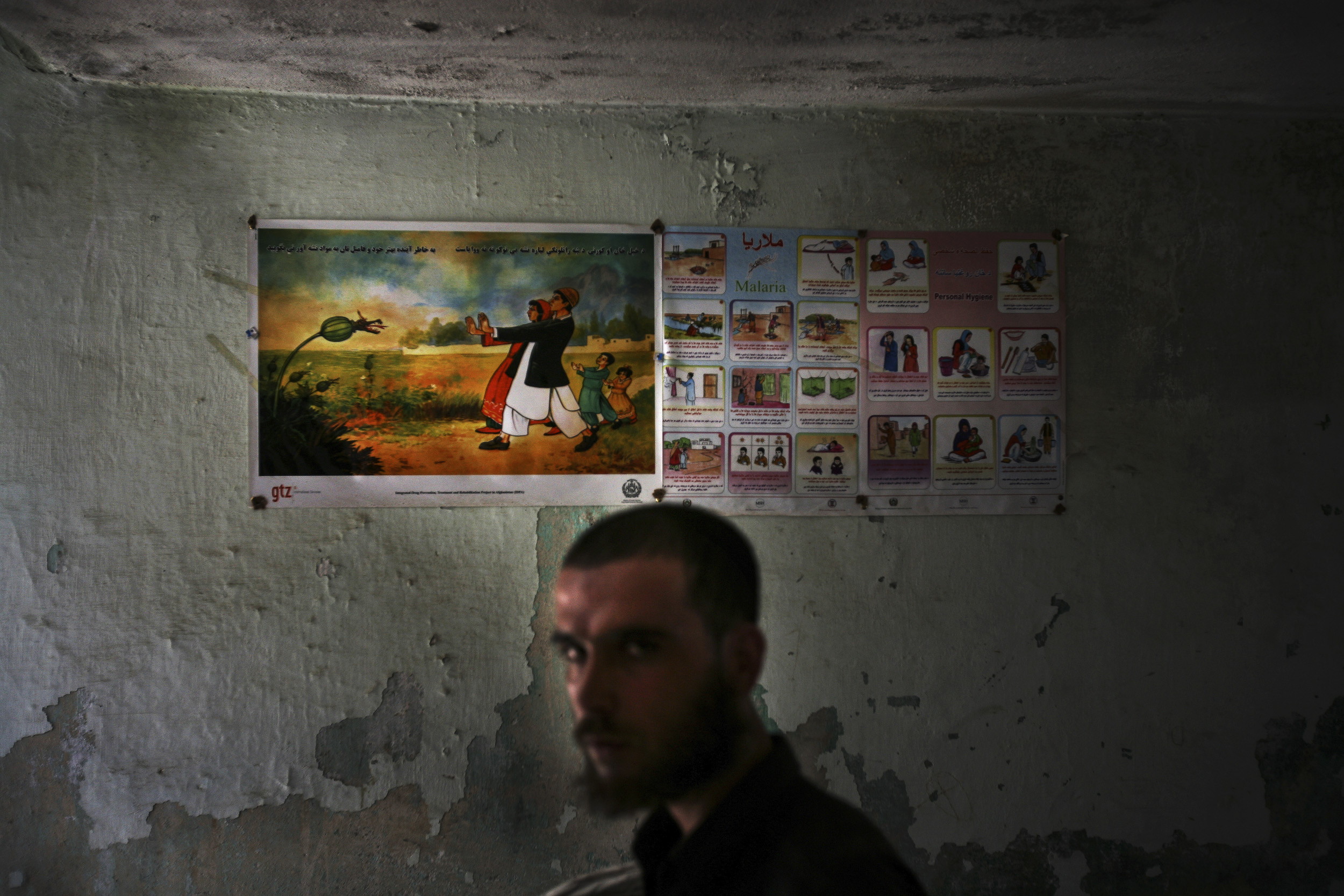
KABUL, AFGHANISTAN-APRIL 2007: Scenes with drug addicts at an underfunded rehabilitation centre and at the place where they use drugs, Kabul Afghanistan, 16 April 2007. CNN Senior international correspondent Anderson Cooper interviews addicts for a show on the drug war taking place in Afghanistan today. (Photo by Brent Stirton/Getty Images.)
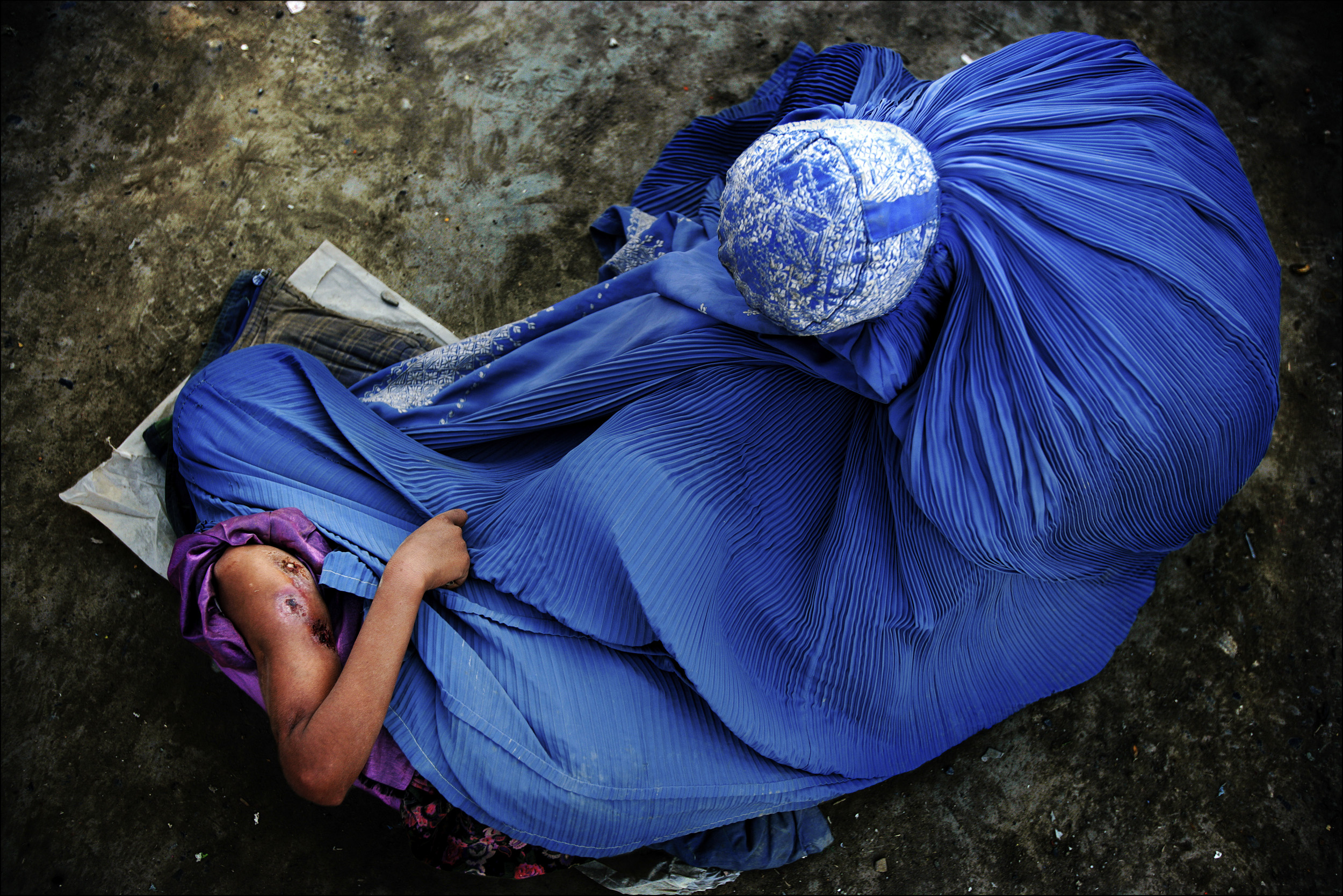
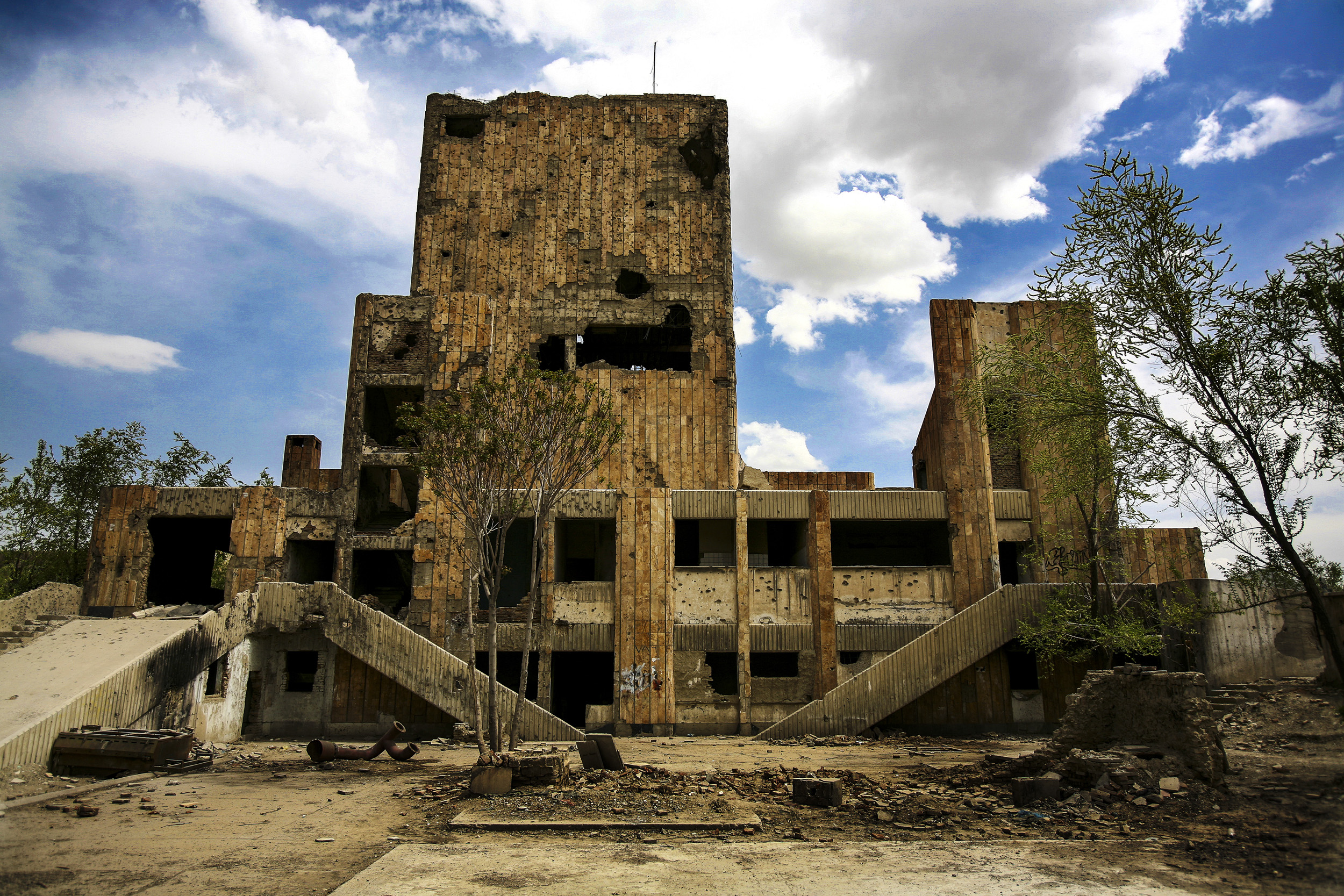
KABUL, AFGHANISTAN-APRIL 2007: Scenes with drug addicts at an underfunded rehabilitation centre and at the place where they use drugs, Kabul Afghanistan, 16 April 2007. CNN Senior international correspondent Anderson Cooper interviews addicts for a show on the drug war taking place in Afghanistan today. (Photo by Brent Stirton/Getty Images.)
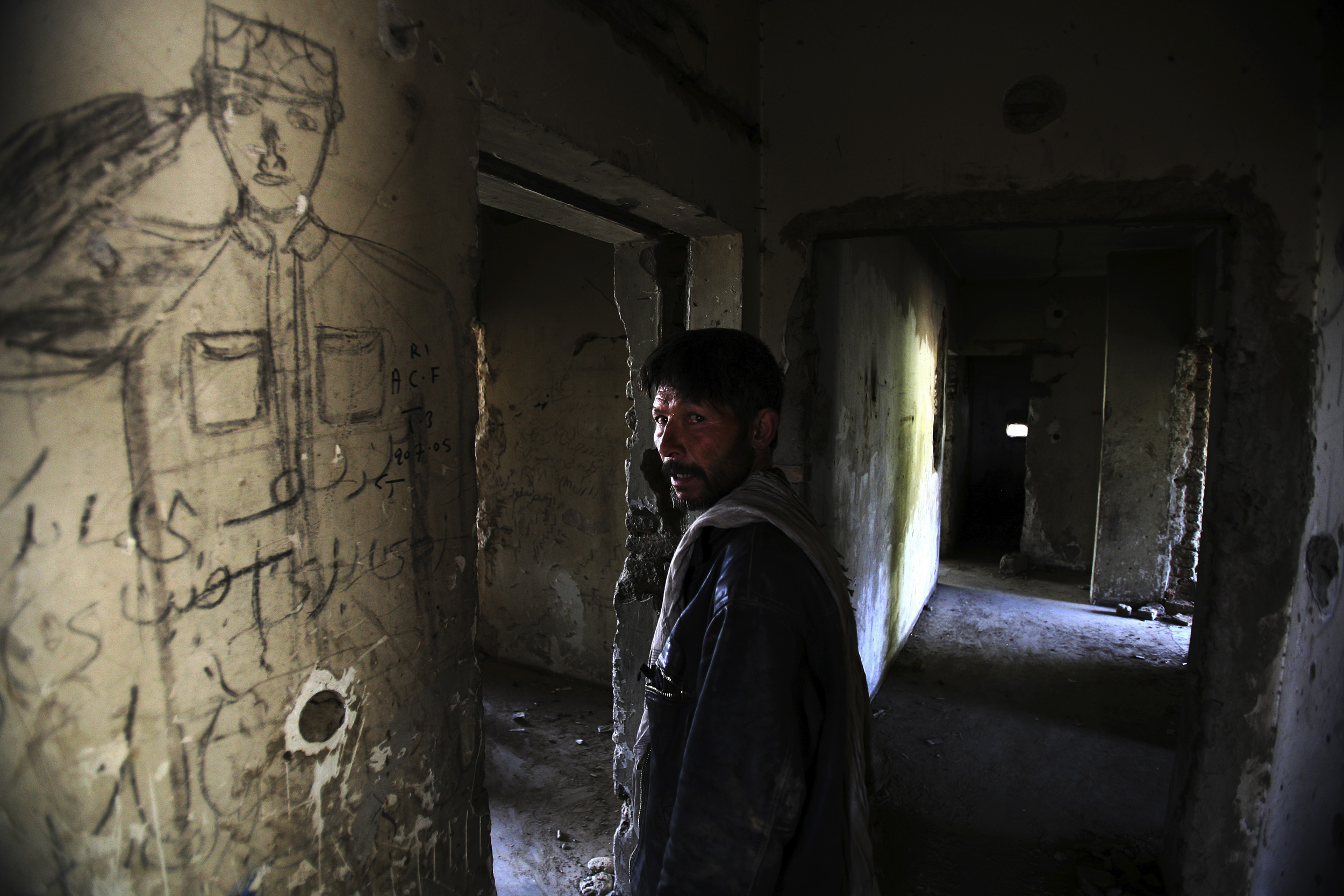
KABUL, AFGHANISTAN-APRIL 2007: Scenes with drug addicts at an underfunded rehabilitation centre and at the place where they use drugs, Kabul Afghanistan, 16 April 2007. CNN Senior international correspondent Anderson Cooper interviews addicts for a show on the drug war taking place in Afghanistan today. (Photo by Brent Stirton/Getty Images.)
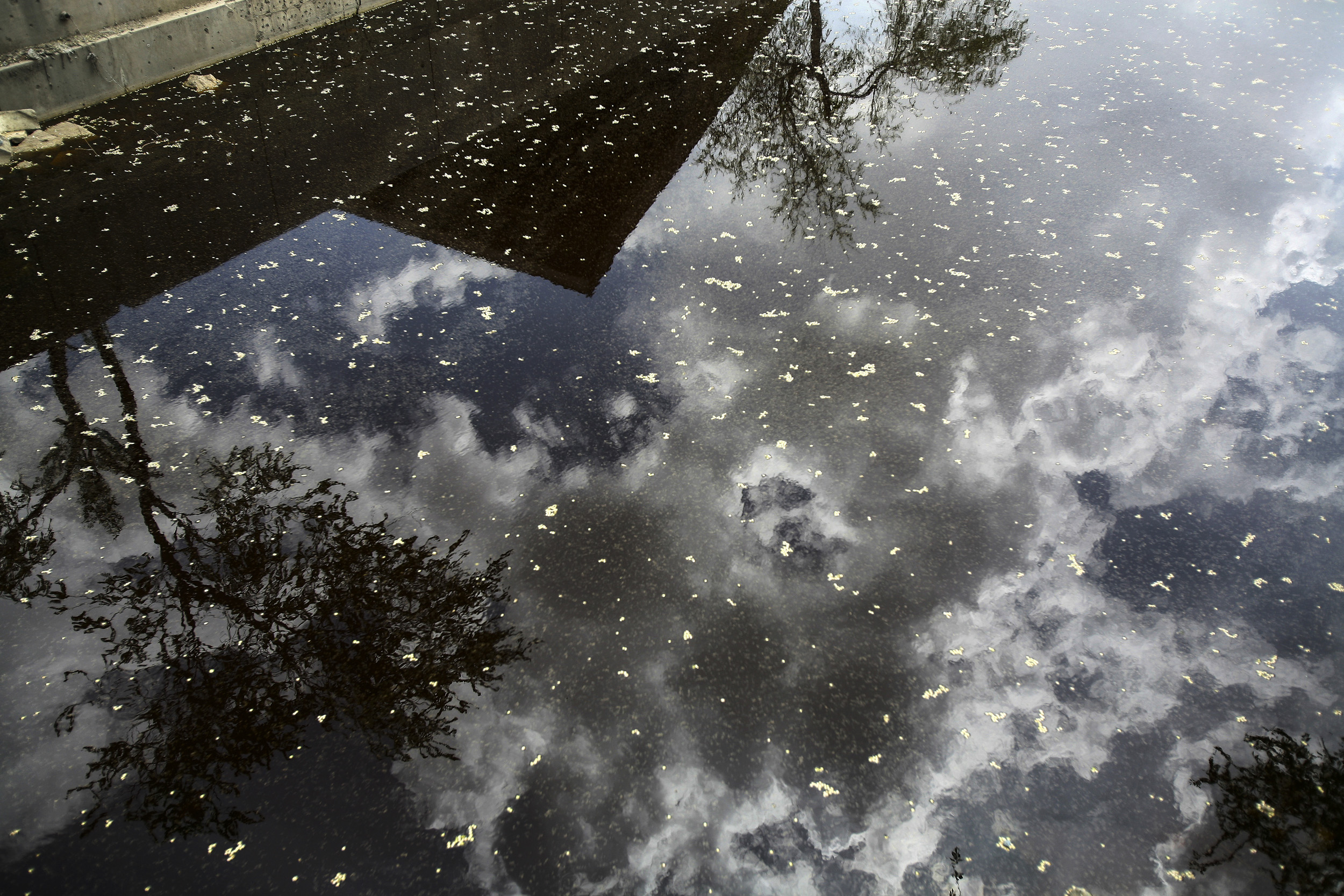
KABUL, AFGHANISTAN-APRIL 2007: Scenes with drug addicts at an underfunded rehabilitation centre and at the place where they use drugs, Kabul Afghanistan, 16 April 2007. CNN Senior international correspondent Anderson Cooper interviews addicts for a show on the drug war taking place in Afghanistan today. (Photo by Brent Stirton/Getty Images.)
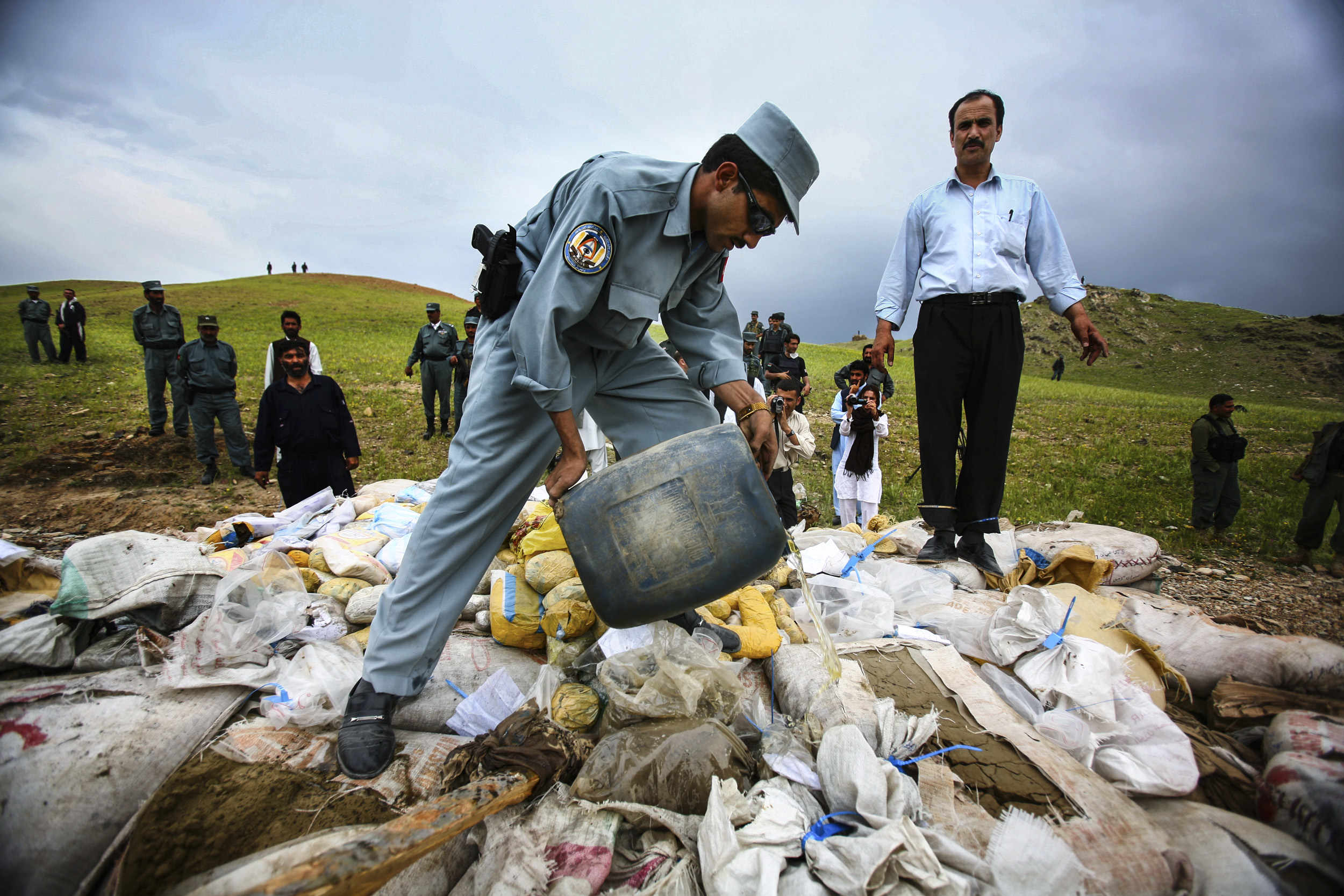
JALALABAD, AFGHANISTAN-APRIL 2007: Afghanistan counter-narcotics forces dispose of over 2500kg of confiscated opium, heroin and hashish they have recovered in various busts and investigations across the poppy growing areas around Jalalabad, Afghanistan, 19 April 2007. Afghanistan currently produces over 90% of the world's illegal opium and the industry accounts for over 45% of the countries annual GDP. The event is filmed by CNN freelance crew Cameraman Richard Parry and producer Tresha Mabile. (Photo by Brent Stirton/Getty Images.)
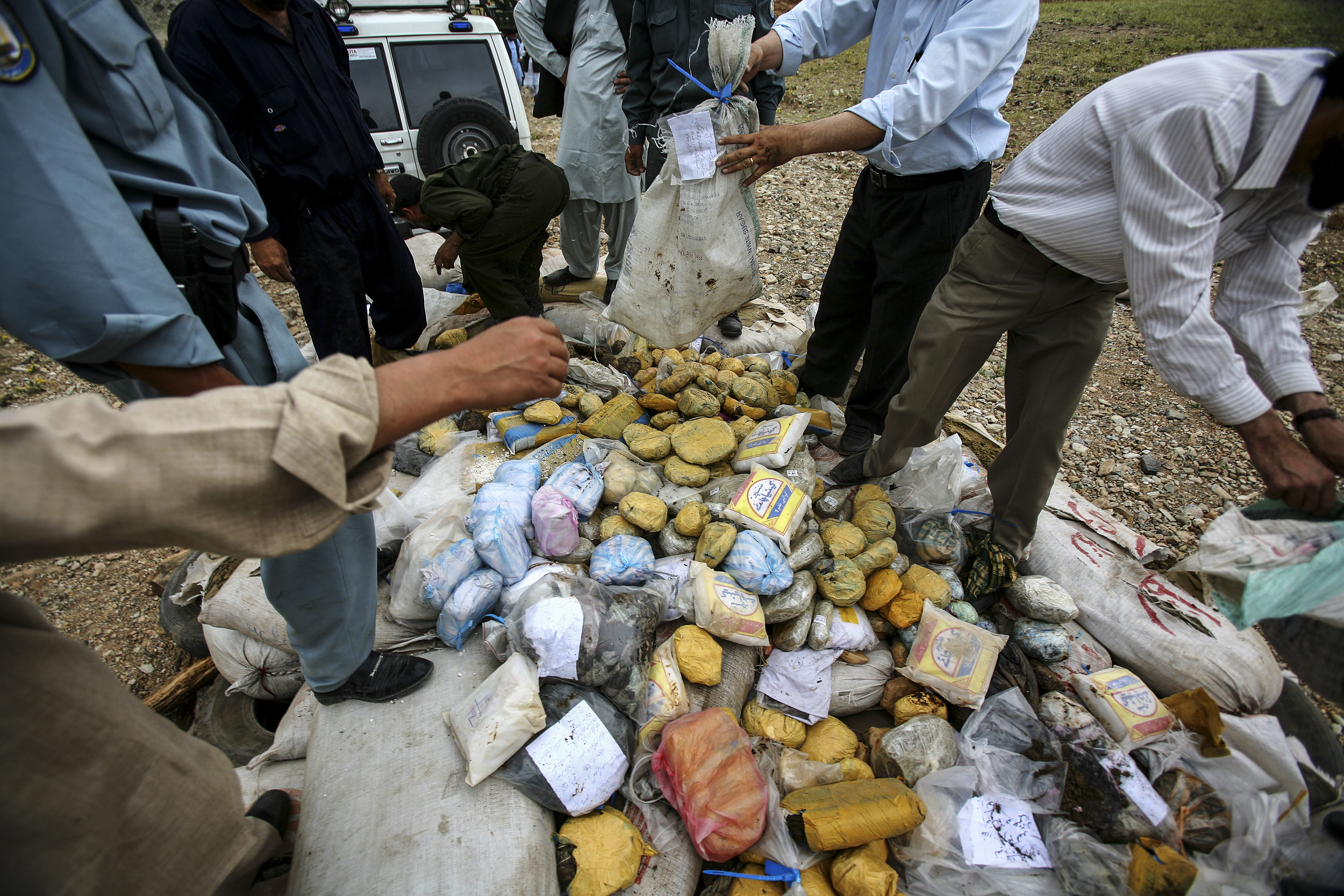
JALALABAD, AFGHANISTAN-APRIL 2007: Afghanistan counter-narcotics forces dispose of over 2500kg of confiscated opium, heroin and hashish they have recovered in various busts and investigations across the poppy growing areas around Jalalabad, Afghanistan, 19 April 2007. Afghanistan currently produces over 90% of the world's illegal opium and the industry accounts for over 45% of the countries annual GDP. The event is filmed by CNN freelance crew Cameraman Richard Parry and producer Tresha Mabile. (Photo by Brent Stirton/Getty Images.)
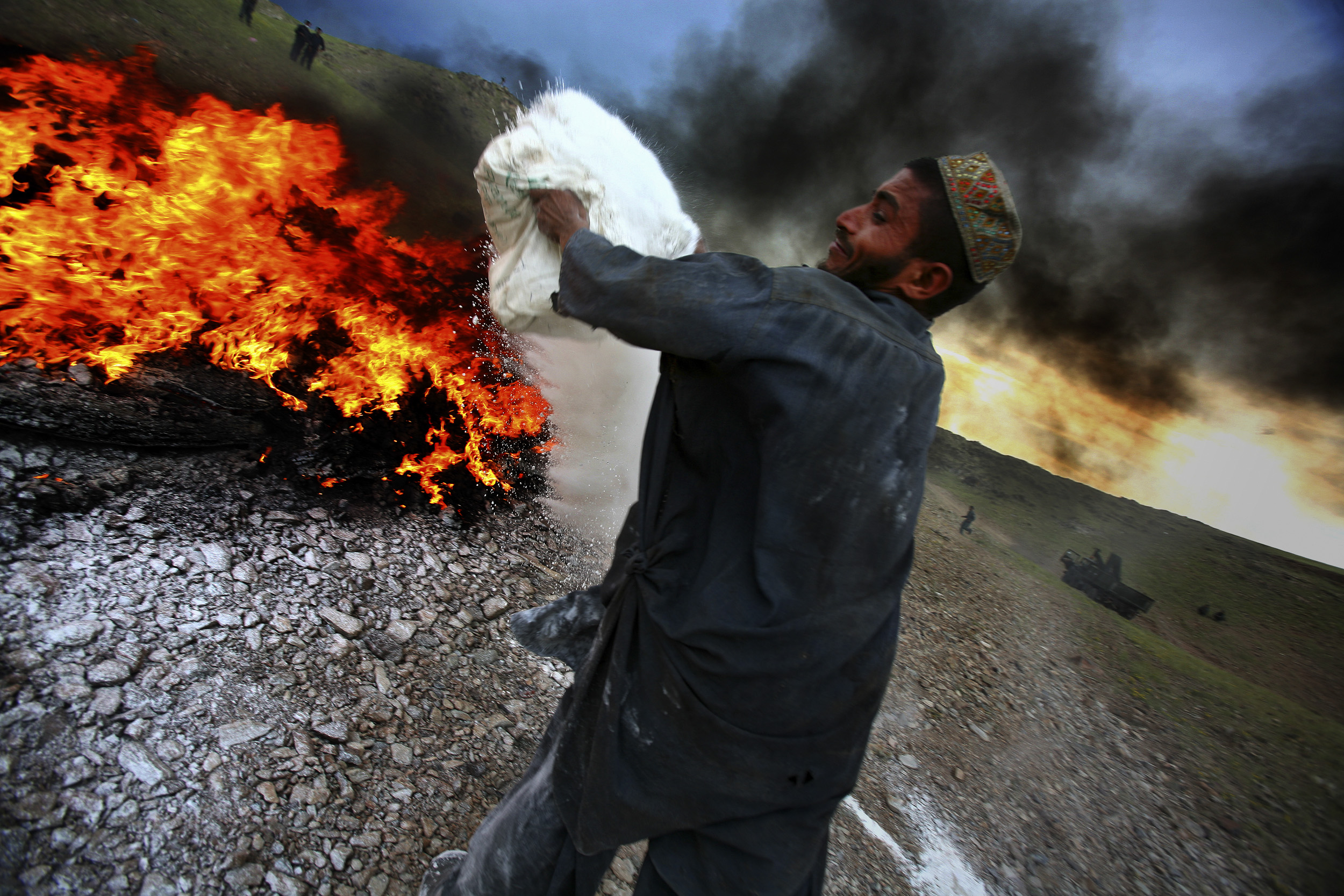
JALALABAD, AFGHANISTAN-APRIL 2007: Afghanistan counter-narcotics forces dispose of over 2500kg of confiscated opium, heroin and hashish they have recovered in various busts and investigations across the poppy growing areas around Jalalabad, Afghanistan, 19 April 2007. Afghanistan currently produces over 90% of the world's illegal opium and the industry accounts for over 45% of the countries annual GDP. The event is filmed by CNN freelance crew Cameraman Richard Parry and producer Tresha Mabile. (Photo by Brent Stirton/Getty Images.)
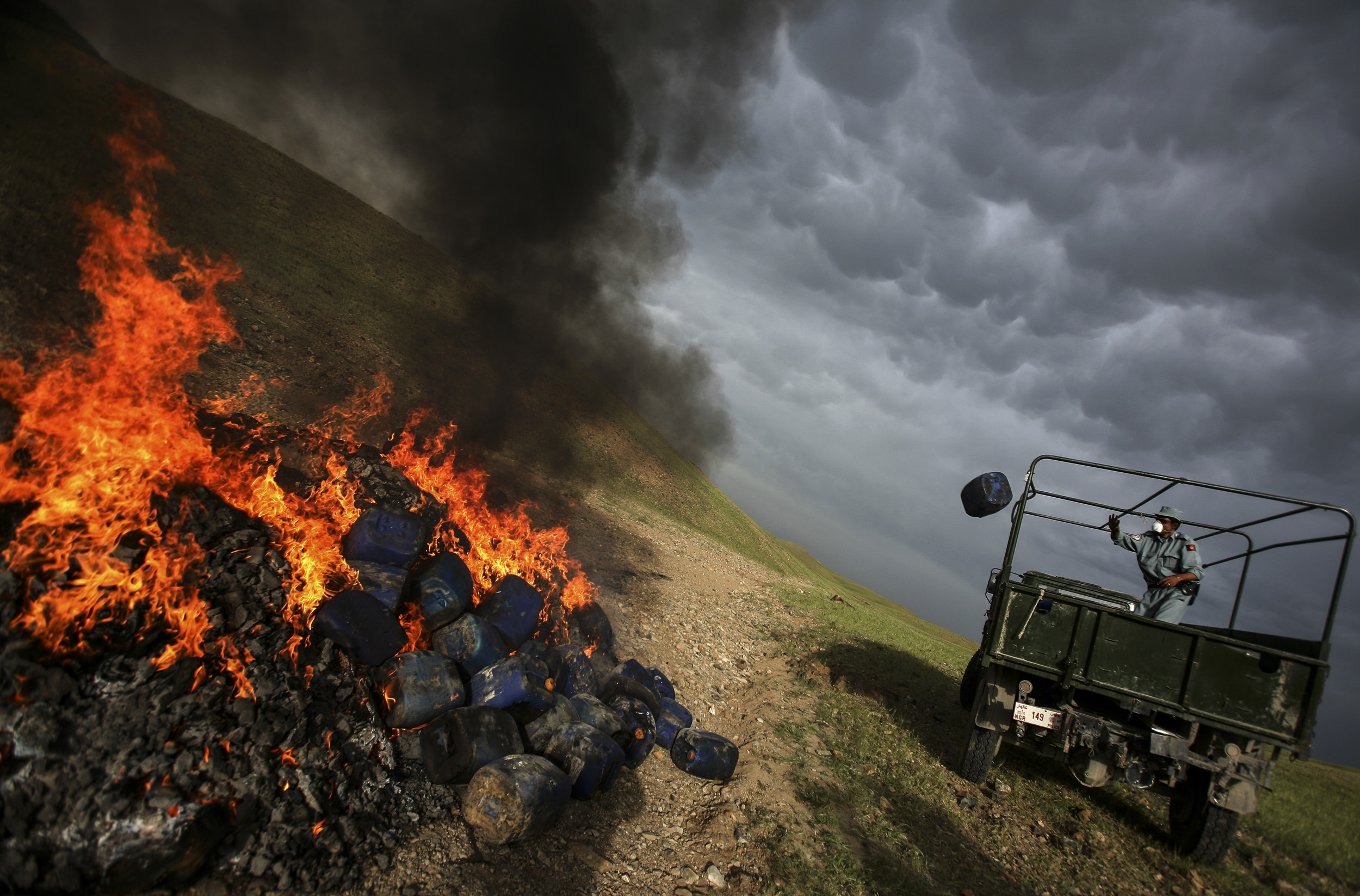
JALALABAD, AFGHANISTAN-APRIL 2007: Afghanistan counter-narcotics forces dispose of over 2500kg of confiscated opium, heroin and hashish they have recovered in various busts and investigations across the poppy growing areas around Jalalabad, Afghanistan, 19 April 2007. Afghanistan currently produces over 90% of the world's illegal opium and the industry accounts for over 45% of the countries annual GDP. The event is filmed by CNN freelance crew Cameraman Richard Parry and producer Tresha Mabile. (Photo by Brent Stirton/Getty Images.)
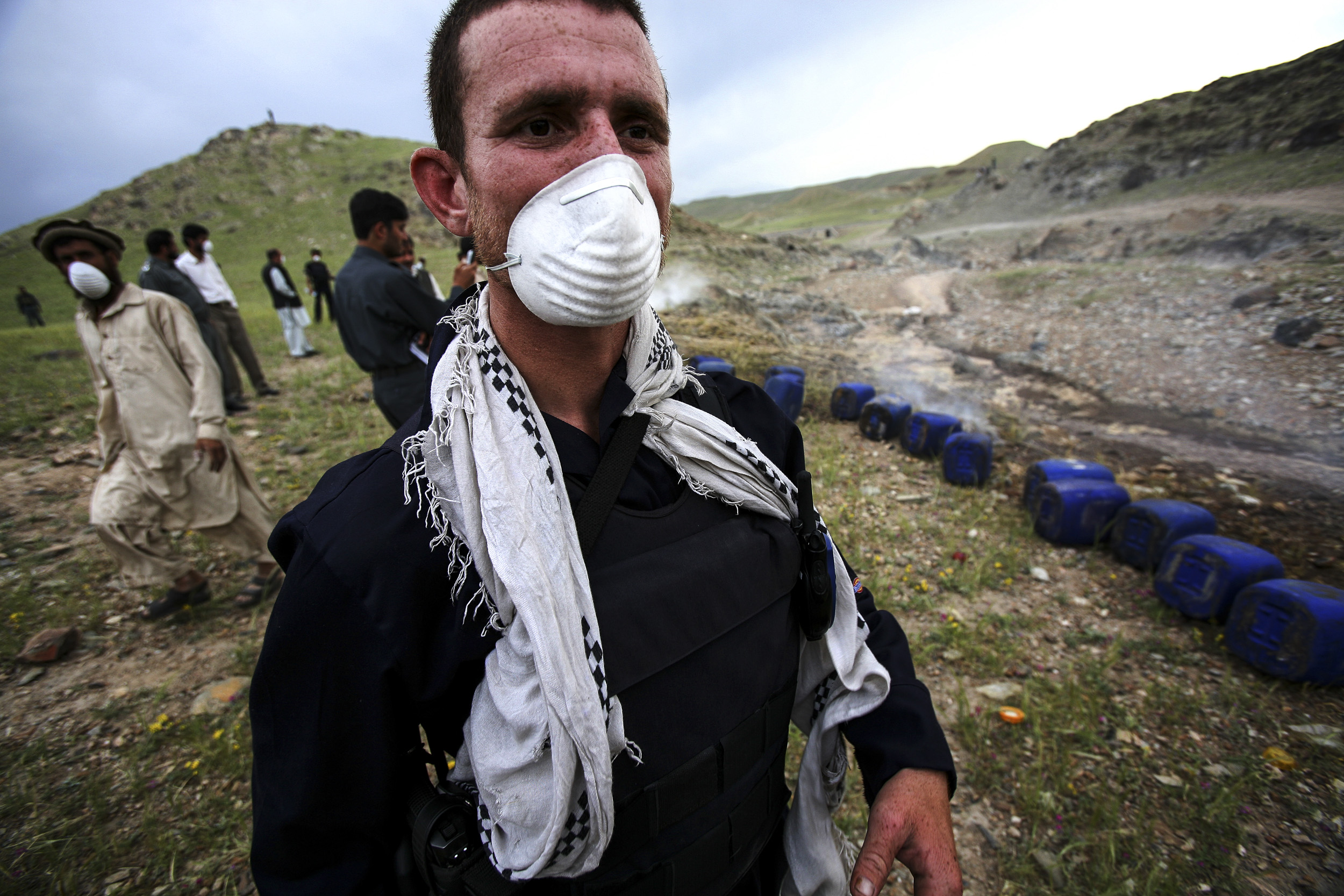
JALALABAD, AFGHANISTAN-APRIL 2007: Afghanistan counter-narcotics forces dispose of over 2500kg of confiscated opium, heroin and hashish they have recovered in various busts and investigations across the poppy growing areas around Jalalabad, Afghanistan, 19 April 2007. Afghanistan currently produces over 90% of the world's illegal opium and the industry accounts for over 45% of the countries annual GDP. The event is filmed by CNN freelance crew Cameraman Richard Parry and producer Tresha Mabile. (Photo by Brent Stirton/Getty Images.)
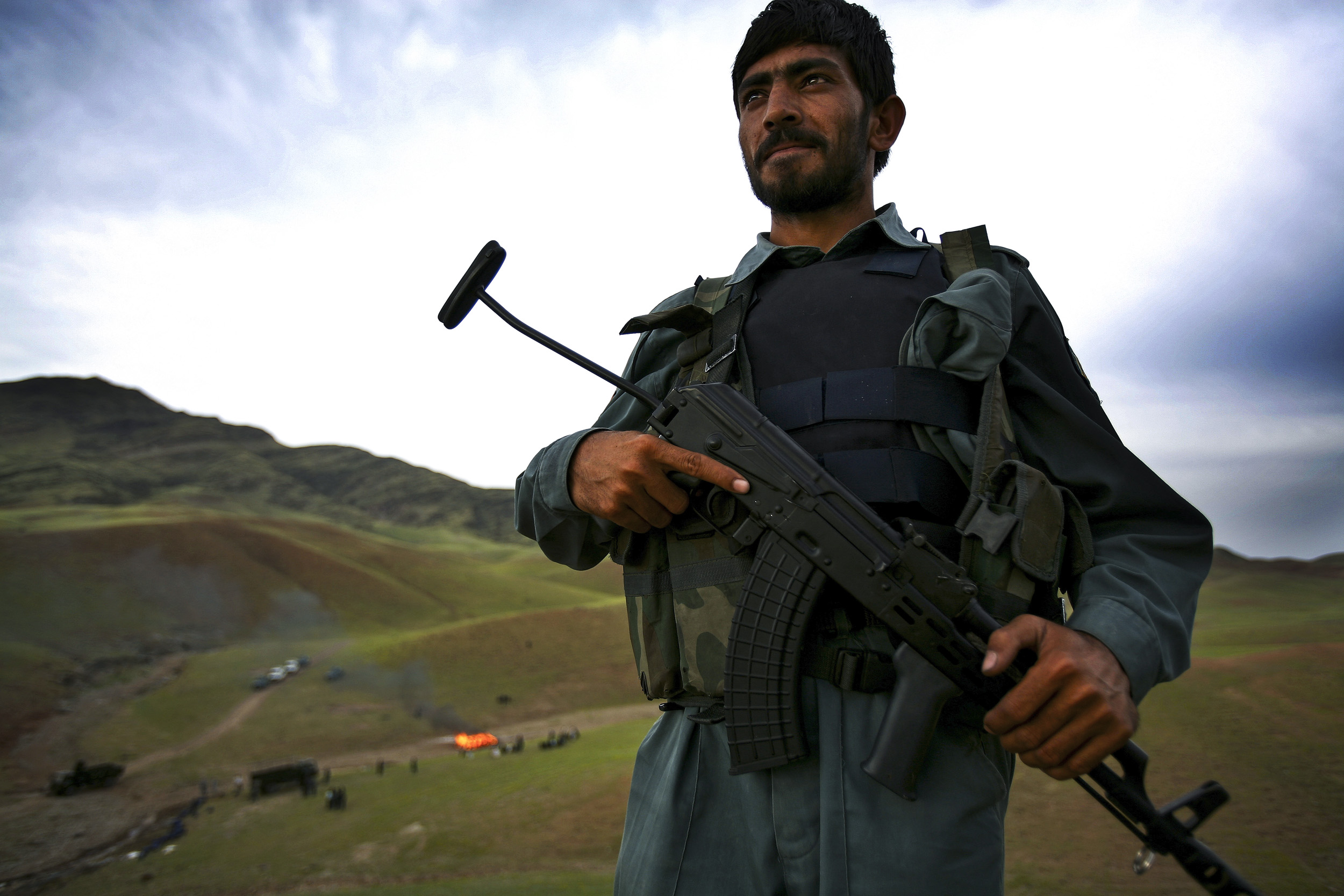
JALALABAD, AFGHANISTAN-APRIL 2007: Afghanistan counter-narcotics forces dispose of over 2500kg of confiscated opium, heroin and hashish they have recovered in various busts and investigations across the poppy growing areas around Jalalabad, Afghanistan, 19 April 2007. Afghanistan currently produces over 90% of the world's illegal opium and the industry accounts for over 45% of the countries annual GDP. The event is filmed by CNN freelance crew Cameraman Richard Parry and producer Tresha Mabile. (Photo by Brent Stirton/Getty Images.)
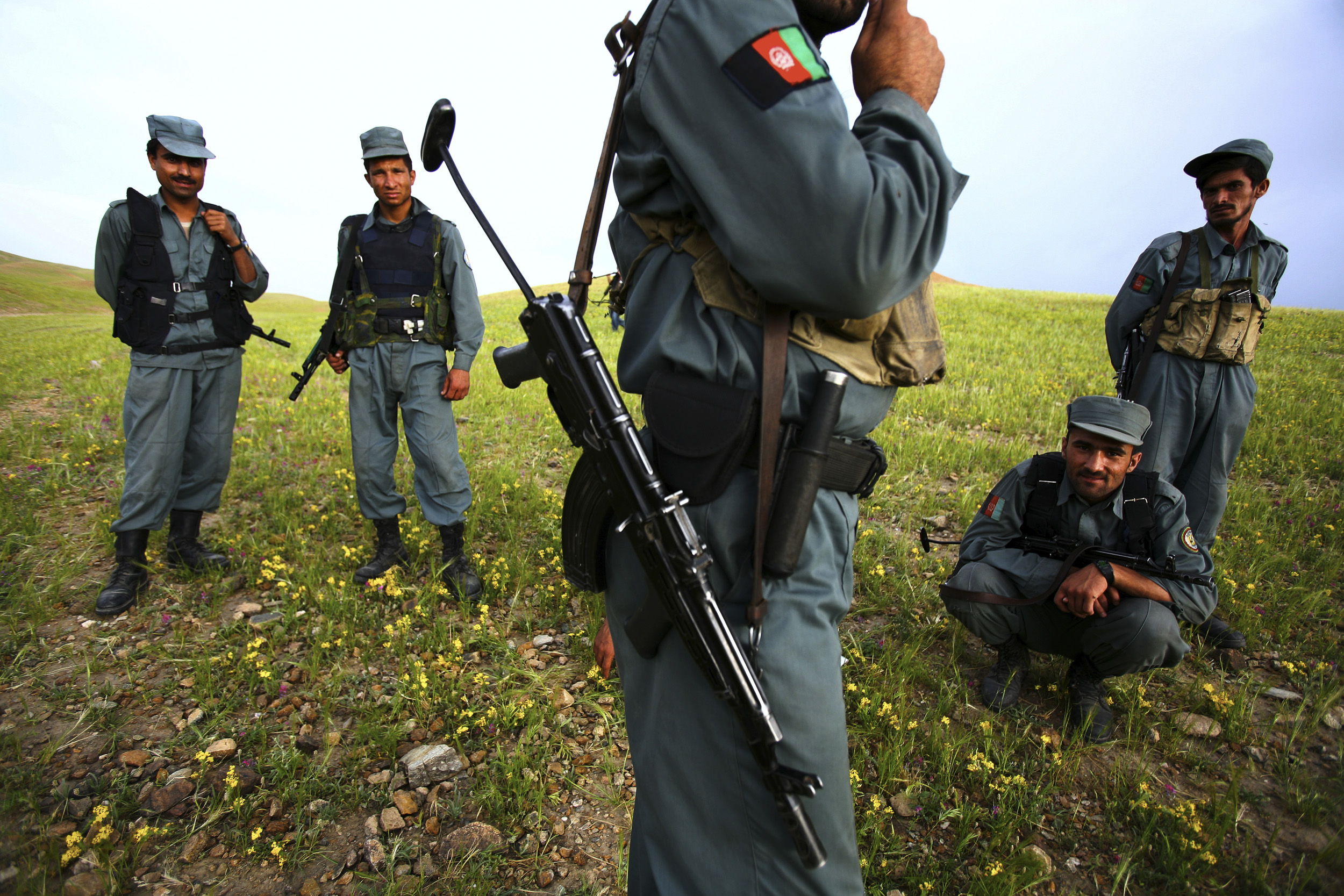
JALALABAD, AFGHANISTAN-APRIL 2007: Afghanistan counter-narcotics forces dispose of over 2500kg of confiscated opium, heroin and hashish they have recovered in various busts and investigations across the poppy growing areas around Jalalabad, Afghanistan, 19 April 2007. Afghanistan currently produces over 90% of the world's illegal opium and the industry accounts for over 45% of the countries annual GDP. The event is filmed by CNN freelance crew Cameraman Richard Parry and producer Tresha Mabile. (Photo by Brent Stirton/Getty Images.)
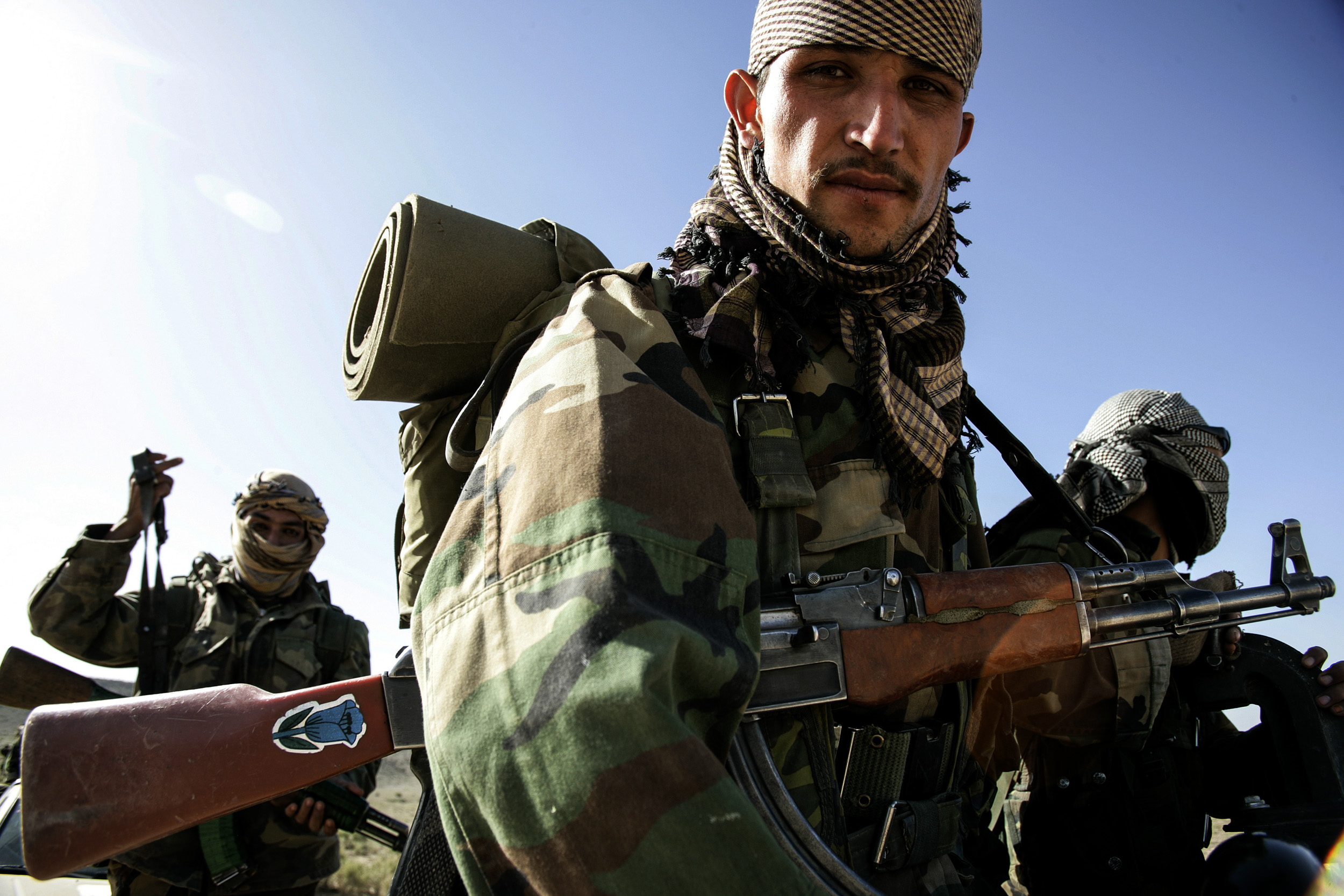
Paktika Province, FOB Bermel, Afghanistan: CNN Anchor Anderson Cooper and Field producer Charlie Moore and Photojournalist Phillip Littleton at US foward operating base Bermel in the Paktika Province in Afghanistan. The CNN crews shot the 9/11 anniversary at the base and went on patrol with both US and Afghan Army soldiers. While at the base the crew experienced a rocket attack from insurgents which forced the initial 9/11 comemoration to be halted while the soldiers sought shelter underground in bunkers. Photo by Brent Stirton/Getty Images
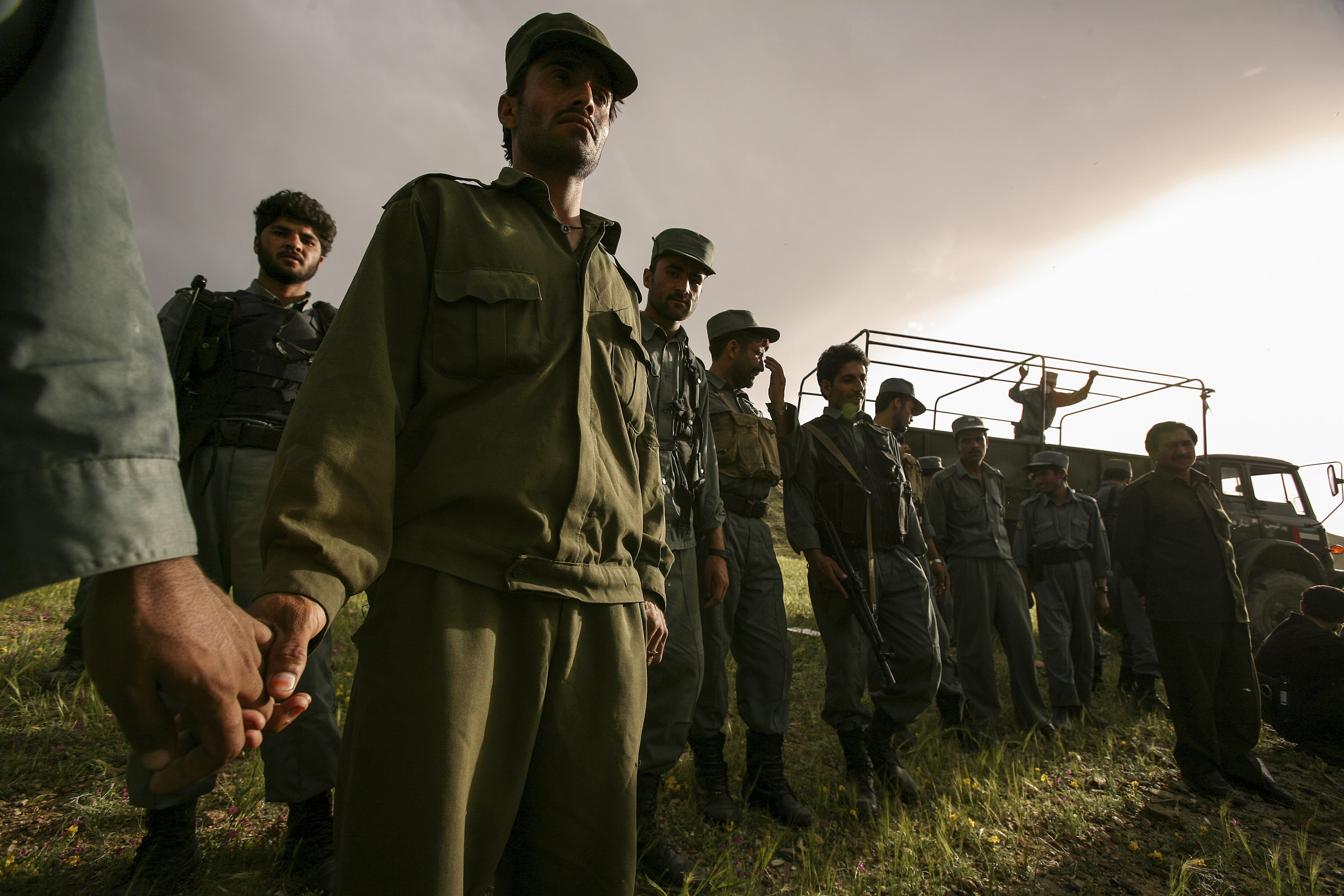
JALALABAD, AFGHANISTAN-APRIL 2007: Afghanistan counter-narcotics forces dispose of over 2500kg of confiscated opium, heroin and hashish they have recovered in various busts and investigations across the poppy growing areas around Jalalabad, Afghanistan, 19 April 2007. Afghanistan currently produces over 90% of the world's illegal opium and the industry accounts for over 45% of the countries annual GDP. The event is filmed by CNN freelance crew Cameraman Richard Parry and producer Tresha Mabile. (Photo by Brent Stirton/Getty Images.)
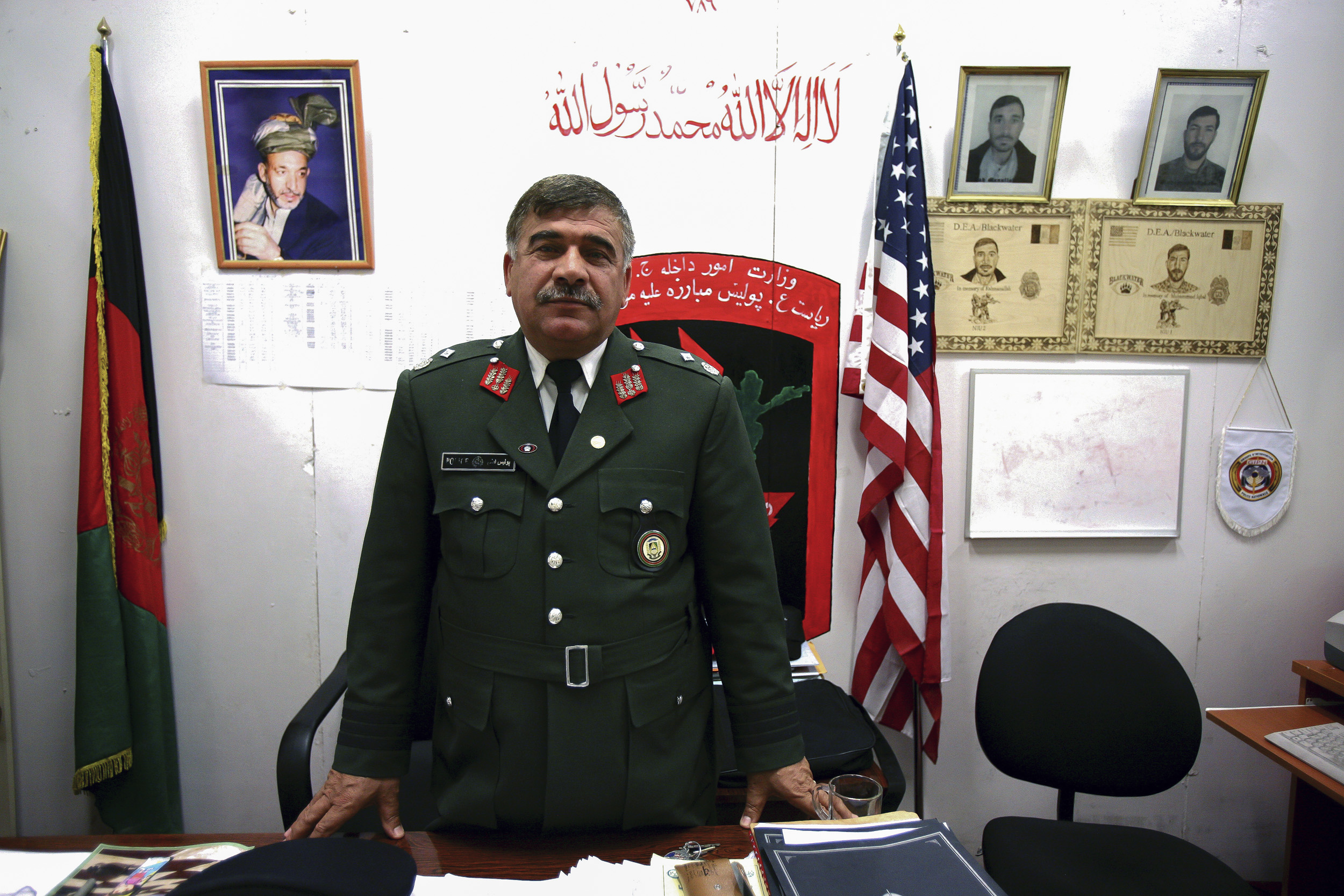
KABUL, AFGHANISTAN-APRIL 2007: Scenes from a drugs bust conducted by the Afghan Anti-Narcotics unit assisted by American DEA agents who have been training these men for over 2 years, Kabul, Afghanistan, 18 April 2007. The images show a search scene and arrest with 2 suspects in custody. 6 kilos of processed heroin was confiscated in the raid. Afghanistan currently produces over 90% of the world's illegal opium and the industry accounts for over 45% of the countries annual GDP. A great deal of this production is based on communal poverty and a lack of alternatives for farmers combined with coercion from the opium cartels of Afghanistan and Pakistan. The event is filmed by CNN freelance crew Cameraman Richard Parry and producer Tresha Mabile. (Photo by Brent Stirton/Getty Images.)
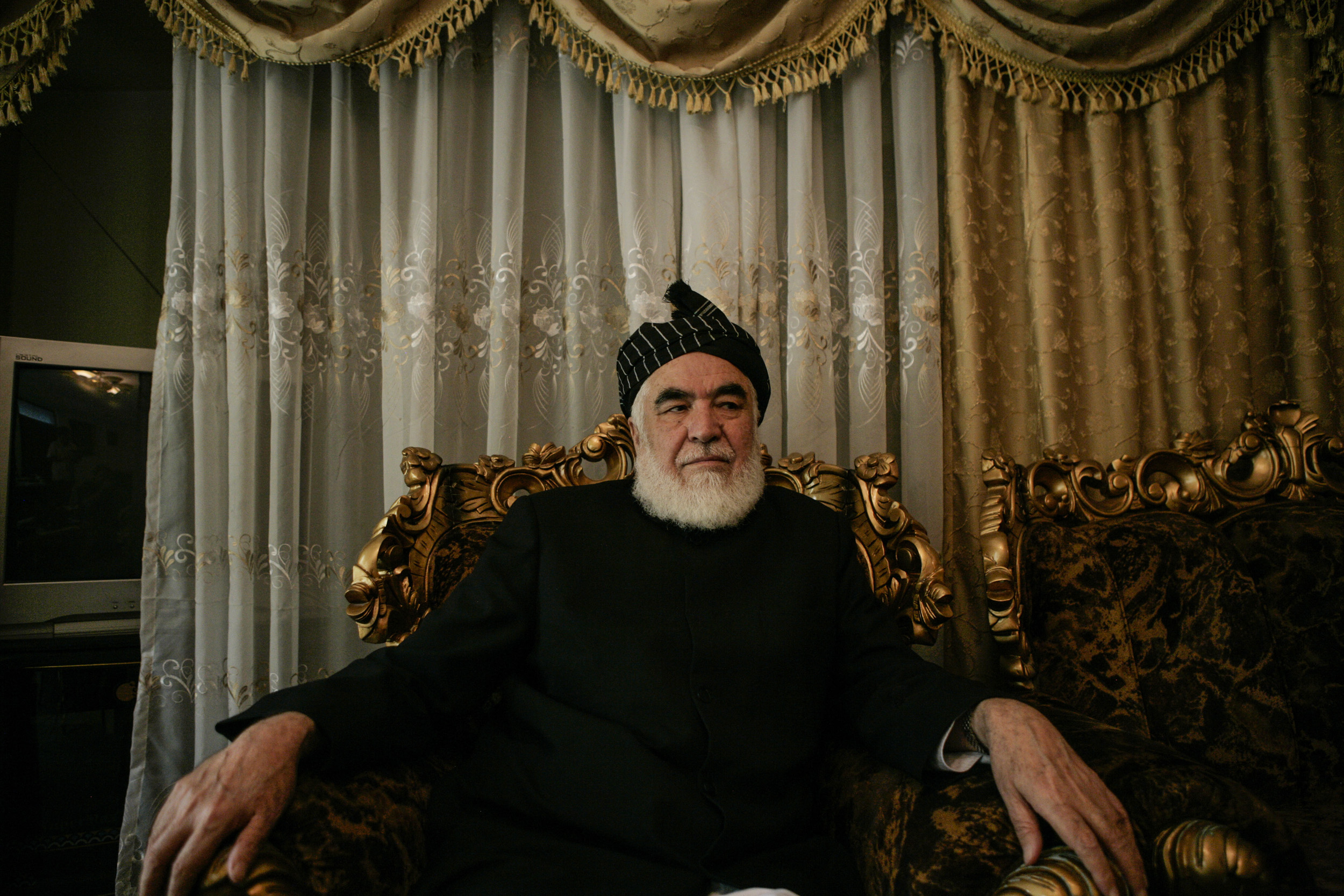
Kabul, Afghanistan, 10 September 2006: CNN international correspondent Anderson Cooper and crew interview Minister Shaharani of the Ministry of the Haj and Islamic affairs. CNN was probing a story about vice and virtue at the time. Photo by Brent Stirton/Getty Images.
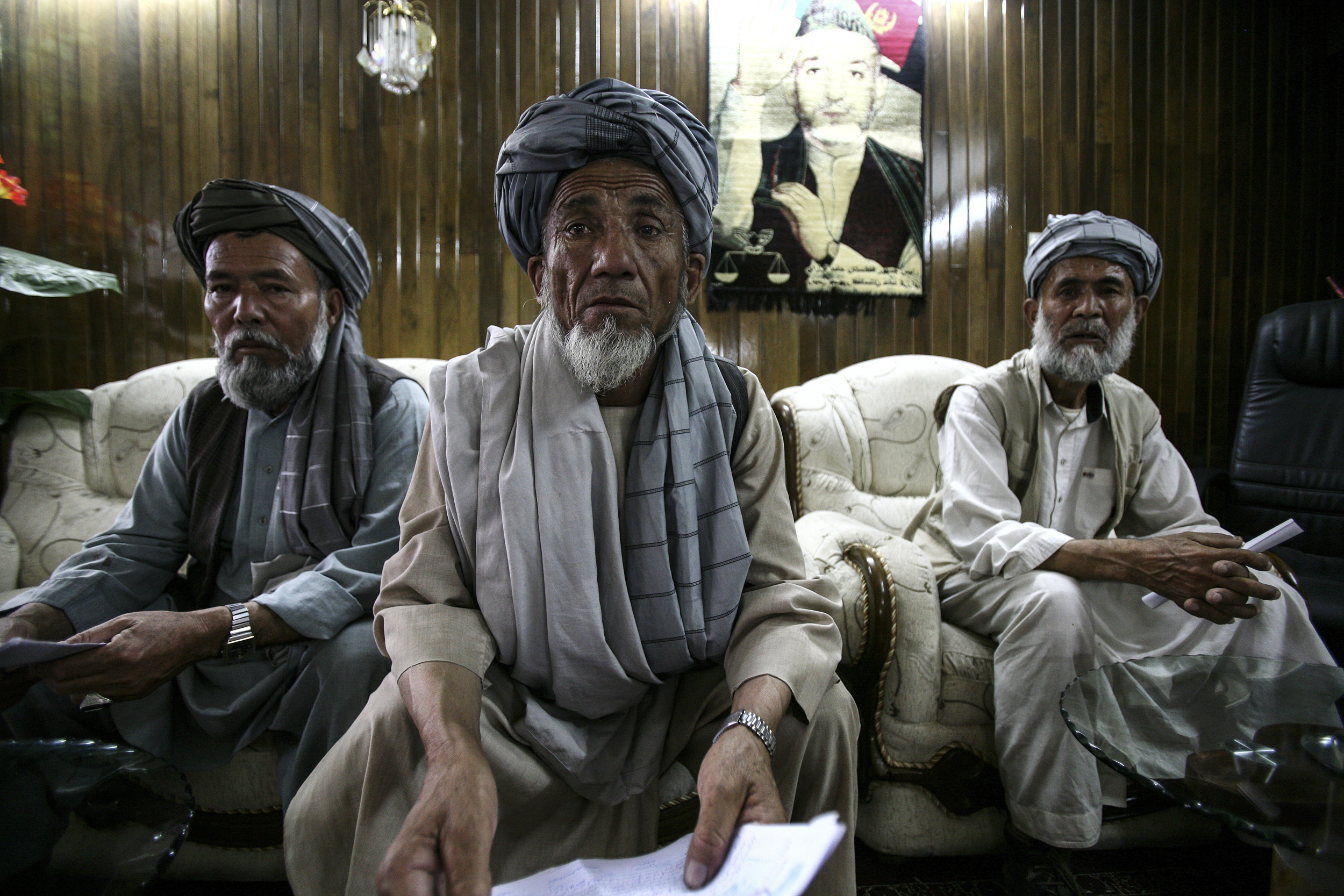
KABUL, AFGHANISTAN-APRIL 2007: Scenes from the office of the Attorney General of Afghanistan, a man who has vowed a war against corruption in the troubled country, Kabul Afghanistan, 16 April 2007. CNN Senior international correspondent Anderson Cooper interviews the Attorney General for a show on the drug war taking place in Afghanistan today. (Photo by Brent Stirton/Getty Images.)
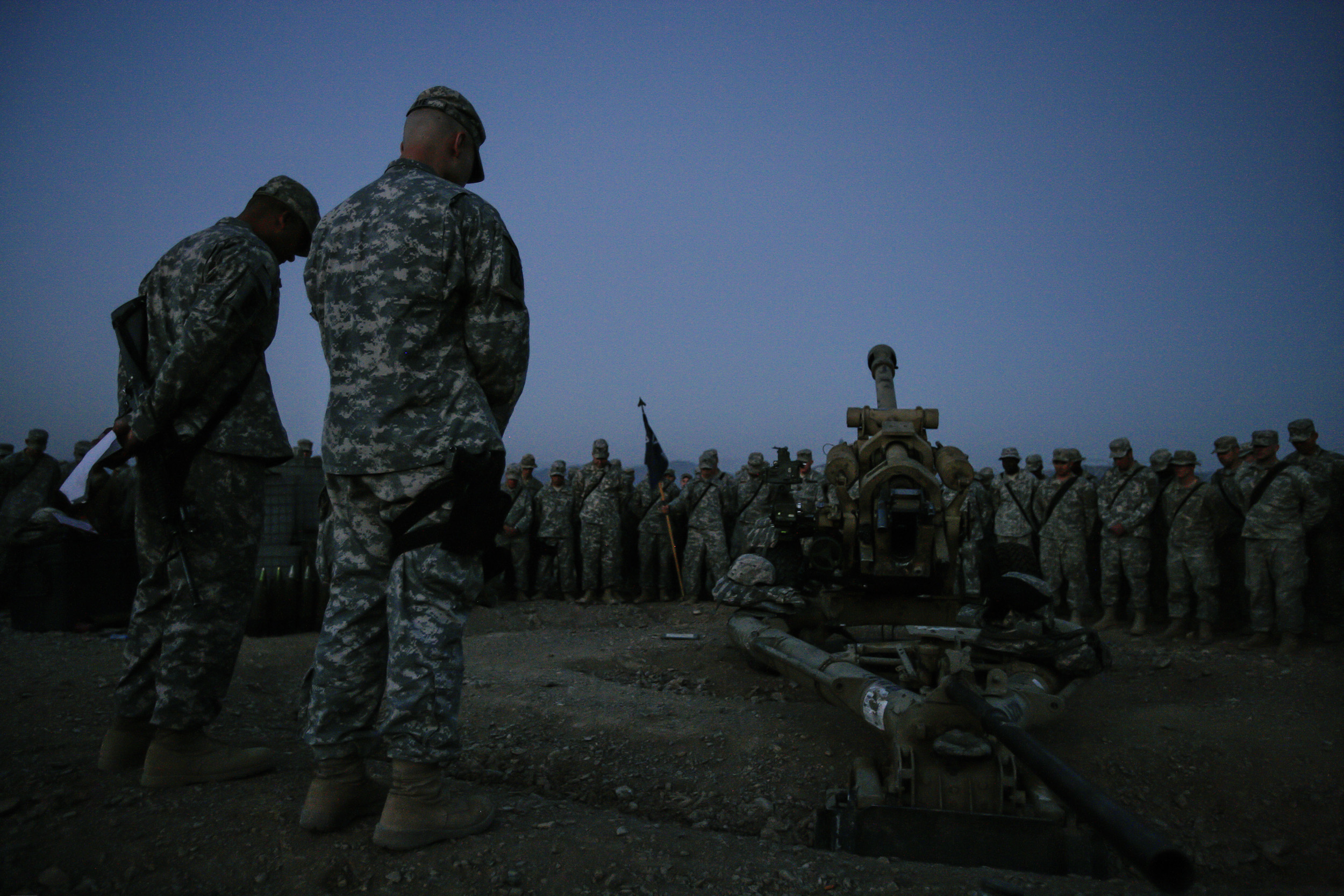
Paktika Province, FOB Bermel, Afghanistan: CNN Anchor Anderson Cooper and Field producer Charlie Moore and Photojournalist Phillip Littleton at US foward operating base Bermel in the Paktika Province in Afghanistan. The CNN crews shot the 9/11 anniversary at the base and went on patrol with both US and Afghan Army soldiers. While at the base the crew experienced a rocket attack from insurgents which forced the initial 9/11 comemoration to be halted while the soldiers sought shelter underground in bunkers. Photo by Brent Stirton/Getty Images



































KABUL, AFGHANISTAN-APRIL 2007: Scenes from a drugs bust conducted by the Afghan Anti-Narcotics unit assisted by American DEA agents who have been training these men for over 2 years, Kabul, Afghanistan, 18 April 2007. The images show a search scene and arrest with 2 suspects in custody. 6 kilos of processed heroin was confiscated in the raid. Afghanistan currently produces over 90% of the world's illegal opium and the industry accounts for over 45% of the countries annual GDP. A great deal of this production is based on communal poverty and a lack of alternatives for farmers combined with coercion from the opium cartels of Afghanistan and Pakistan. The event is filmed by CNN freelance crew Cameraman Richard Parry and producer Tresha Mabile. (Photo by Brent Stirton/Getty Images.)
KABUL, AFGHANISTAN-APRIL 2007: Scenes from a drugs bust conducted by the Afghan Anti-Narcotics unit assisted by American DEA agents who have been training these men for over 2 years, Kabul, Afghanistan, 18 April 2007. The images show a search scene and arrest with 2 suspects in custody. 6 kilos of processed heroin was confiscated in the raid. Afghanistan currently produces over 90% of the world's illegal opium and the industry accounts for over 45% of the countries annual GDP. A great deal of this production is based on communal poverty and a lack of alternatives for farmers combined with coercion from the opium cartels of Afghanistan and Pakistan. The event is filmed by CNN freelance crew Cameraman Richard Parry and producer Tresha Mabile. (Photo by Brent Stirton/Getty Images.)
KABUL, AFGHANISTAN-APRIL 2007: Scenes from a drugs bust conducted by the Afghan Anti-Narcotics unit assisted by American DEA agents who have been training these men for over 2 years, Kabul, Afghanistan, 18 April 2007. The images show a search scene and arrest with 2 suspects in custody. 6 kilos of processed heroin was confiscated in the raid. Afghanistan currently produces over 90% of the world's illegal opium and the industry accounts for over 45% of the countries annual GDP. A great deal of this production is based on communal poverty and a lack of alternatives for farmers combined with coercion from the opium cartels of Afghanistan and Pakistan. The event is filmed by CNN freelance crew Cameraman Richard Parry and producer Tresha Mabile. (Photo by Brent Stirton/Getty Images.)
KABUL, AFGHANISTAN-APRIL 2007: Scenes from a drugs bust conducted by the Afghan Anti-Narcotics unit assisted by American DEA agents who have been training these men for over 2 years, Kabul, Afghanistan, 18 April 2007. The images show a search scene and arrest with 2 suspects in custody. 6 kilos of processed heroin was confiscated in the raid. Afghanistan currently produces over 90% of the world's illegal opium and the industry accounts for over 45% of the countries annual GDP. A great deal of this production is based on communal poverty and a lack of alternatives for farmers combined with coercion from the opium cartels of Afghanistan and Pakistan. The event is filmed by CNN freelance crew Cameraman Richard Parry and producer Tresha Mabile. (Photo by Brent Stirton/Getty Images.)
KABUL, AFGHANISTAN-APRIL 2007: Scenes from a drugs bust conducted by the Afghan Anti-Narcotics unit assisted by American DEA agents who have been training these men for over 2 years, Kabul, Afghanistan, 18 April 2007. The images show a search scene and arrest with 2 suspects in custody. 6 kilos of processed heroin was confiscated in the raid. Afghanistan currently produces over 90% of the world's illegal opium and the industry accounts for over 45% of the countries annual GDP. A great deal of this production is based on communal poverty and a lack of alternatives for farmers combined with coercion from the opium cartels of Afghanistan and Pakistan. The event is filmed by CNN freelance crew Cameraman Richard Parry and producer Tresha Mabile. (Photo by Brent Stirton/Getty Images.)
KABUL, AFGHANISTAN-APRIL 2007: Scenes from a drugs bust conducted by the Afghan Anti-Narcotics unit assisted by American DEA agents who have been training these men for over 2 years, Kabul, Afghanistan, 18 April 2007. The images show a search scene and arrest with 2 suspects in custody. 6 kilos of processed heroin was confiscated in the raid. Afghanistan currently produces over 90% of the world's illegal opium and the industry accounts for over 45% of the countries annual GDP. A great deal of this production is based on communal poverty and a lack of alternatives for farmers combined with coercion from the opium cartels of Afghanistan and Pakistan. The event is filmed by CNN freelance crew Cameraman Richard Parry and producer Tresha Mabile. (Photo by Brent Stirton/Getty Images.)
KABUL, AFGHANISTAN-APRIL 2007: Scenes from a drugs bust conducted by the Afghan Anti-Narcotics unit assisted by American DEA agents who have been training these men for over 2 years, Kabul, Afghanistan, 18 April 2007. The images show a search scene and arrest with 2 suspects in custody. 6 kilos of processed heroin was confiscated in the raid. Afghanistan currently produces over 90% of the world's illegal opium and the industry accounts for over 45% of the countries annual GDP. A great deal of this production is based on communal poverty and a lack of alternatives for farmers combined with coercion from the opium cartels of Afghanistan and Pakistan. The event is filmed by CNN freelance crew Cameraman Richard Parry and producer Tresha Mabile. (Photo by Brent Stirton/Getty Images.)
KABUL, AFGHANISTAN-APRIL 2007: Scenes from a drugs bust conducted by the Afghan Anti-Narcotics unit assisted by American DEA agents who have been training these men for over 2 years, Kabul, Afghanistan, 18 April 2007. The images show a search scene and arrest with 2 suspects in custody. 6 kilos of processed heroin was confiscated in the raid. Afghanistan currently produces over 90% of the world's illegal opium and the industry accounts for over 45% of the countries annual GDP. A great deal of this production is based on communal poverty and a lack of alternatives for farmers combined with coercion from the opium cartels of Afghanistan and Pakistan. The event is filmed by CNN freelance crew Cameraman Richard Parry and producer Tresha Mabile. (Photo by Brent Stirton/Getty Images.)
KABUL, AFGHANISTAN-APRIL 2007: Scenes from a drugs bust conducted by the Afghan Anti-Narcotics unit assisted by American DEA agents who have been training these men for over 2 years, Kabul, Afghanistan, 18 April 2007. The images show a search scene and arrest with 2 suspects in custody. 6 kilos of processed heroin was confiscated in the raid. Afghanistan currently produces over 90% of the world's illegal opium and the industry accounts for over 45% of the countries annual GDP. A great deal of this production is based on communal poverty and a lack of alternatives for farmers combined with coercion from the opium cartels of Afghanistan and Pakistan. The event is filmed by CNN freelance crew Cameraman Richard Parry and producer Tresha Mabile. (Photo by Brent Stirton/Getty Images.)
KABUL, AFGHANISTAN-APRIL 2007: Scenes from the office of the Attorney General of Afghanistan, a man who has vowed a war against corruption in the troubled country, Kabul Afghanistan, 16 April 2007. CNN Senior international correspondent Anderson Cooper interviews the Attorney General for a show on the drug war taking place in Afghanistan today. (Photo by Brent Stirton/Getty Images.)
Kabul, Afghanistan, September 11, 2006: CNN Anchor Anderson Cooper, Field producer Charlie Moore, Photojournalist Phillip Littleton and Senior International Correspondent Nic Robertson, Senior Producer Henry Schuster and photojournalist Todd Baxter fly to US foward operating base Bermel in the Paktika Province in Afghanistan. The CNN crews shot the 9/11 anniversary at the base. Photo by Brent Stirton/Getty Images
Kabul/Jalalabad, Afghanistan 10-16 March 2006: CNN's Chief International Correspondent Christiane Amanpour and CNN's terrorism expert Peter Bergen track Osama Bin Laden as they interview various subjects who knew Bin Laden during his time in Afghanistan. CNN visited his former home in Kabul as well as his bombed out compound near the city of Jalalabad. CNN spoke with former front line commanders from the battles of Tora Bora as well as the governor of Kabul and others who encountered Bin Laden. Amanpour and Bergen were accompanied on this trip by CNN cameraman Mark Phillips, Field Producer Piere Bairin, Senior Producer Ken Shiffman and Producer/ Editor Cliff Hackel. *** Local Caption *** CNN
JALALABAD, AFGHANISTAN-APRIL 2007: Images from illegal opium producing poppy farms an hours travel outside of Jalalabad, Afghanistan, 19 April 2007. Afghanistan currently produces over 90% of the world's illegal opium and the industry accounts for over 45% of the countries annual GDP. A great deal of this production is based on communal poverty and a lack of alternatives for farmers combined with coercion from the opium cartels of Afghanistan and Pakistan. The event is filmed by CNN freelance crew Cameraman Richard Parry and producer Tresha Mabile. (Photo by Brent Stirton/Getty Images.)
JALALABAD, AFGHANISTAN-APRIL 2007: Images from illegal opium producing poppy farms an hours travel outside of Jalalabad, Afghanistan, 19 April 2007. Afghanistan currently produces over 90% of the world's illegal opium and the industry accounts for over 45% of the countries annual GDP. A great deal of this production is based on communal poverty and a lack of alternatives for farmers combined with coercion from the opium cartels of Afghanistan and Pakistan. The event is filmed by CNN freelance crew Cameraman Richard Parry and producer Tresha Mabile. (Photo by Brent Stirton/Getty Images.)
JALALABAD, AFGHANISTAN-APRIL 2007: Images from illegal opium producing poppy farms an hours travel outside of Jalalabad, Afghanistan, 19 April 2007. Afghanistan currently produces over 90% of the world's illegal opium and the industry accounts for over 45% of the countries annual GDP. A great deal of this production is based on communal poverty and a lack of alternatives for farmers combined with coercion from the opium cartels of Afghanistan and Pakistan. The event is filmed by CNN freelance crew Cameraman Richard Parry and producer Tresha Mabile. (Photo by Brent Stirton/Getty Images.)
JALALABAD, AFGHANISTAN-APRIL 2007: Images from illegal opium producing poppy farms an hours travel outside of Jalalabad, Afghanistan, 19 April 2007. Afghanistan currently produces over 90% of the world's illegal opium and the industry accounts for over 45% of the countries annual GDP. A great deal of this production is based on communal poverty and a lack of alternatives for farmers combined with coercion from the opium cartels of Afghanistan and Pakistan. The event is filmed by CNN freelance crew Cameraman Richard Parry and producer Tresha Mabile. (Photo by Brent Stirton/Getty Images.)
KABUL, AFGHANISTAN-APRIL 2007: Scenes with drug addicts at an underfunded rehabilitation centre and at the place where they use drugs, Kabul Afghanistan, 16 April 2007. CNN Senior international correspondent Anderson Cooper interviews addicts for a show on the drug war taking place in Afghanistan today. (Photo by Brent Stirton/Getty Images.)
KABUL, AFGHANISTAN-APRIL 2007: Scenes with drug addicts at an underfunded rehabilitation centre and at the place where they use drugs, Kabul Afghanistan, 16 April 2007. CNN Senior international correspondent Anderson Cooper interviews addicts for a show on the drug war taking place in Afghanistan today. (Photo by Brent Stirton/Getty Images.)
KABUL, AFGHANISTAN-APRIL 2007: Scenes with drug addicts at an underfunded rehabilitation centre and at the place where they use drugs, Kabul Afghanistan, 16 April 2007. CNN Senior international correspondent Anderson Cooper interviews addicts for a show on the drug war taking place in Afghanistan today. (Photo by Brent Stirton/Getty Images.)
KABUL, AFGHANISTAN-APRIL 2007: Scenes with drug addicts at an underfunded rehabilitation centre and at the place where they use drugs, Kabul Afghanistan, 16 April 2007. CNN Senior international correspondent Anderson Cooper interviews addicts for a show on the drug war taking place in Afghanistan today. (Photo by Brent Stirton/Getty Images.)
KABUL, AFGHANISTAN-APRIL 2007: Scenes with drug addicts at an underfunded rehabilitation centre and at the place where they use drugs, Kabul Afghanistan, 16 April 2007. CNN Senior international correspondent Anderson Cooper interviews addicts for a show on the drug war taking place in Afghanistan today. (Photo by Brent Stirton/Getty Images.)
JALALABAD, AFGHANISTAN-APRIL 2007: Afghanistan counter-narcotics forces dispose of over 2500kg of confiscated opium, heroin and hashish they have recovered in various busts and investigations across the poppy growing areas around Jalalabad, Afghanistan, 19 April 2007. Afghanistan currently produces over 90% of the world's illegal opium and the industry accounts for over 45% of the countries annual GDP. The event is filmed by CNN freelance crew Cameraman Richard Parry and producer Tresha Mabile. (Photo by Brent Stirton/Getty Images.)
JALALABAD, AFGHANISTAN-APRIL 2007: Afghanistan counter-narcotics forces dispose of over 2500kg of confiscated opium, heroin and hashish they have recovered in various busts and investigations across the poppy growing areas around Jalalabad, Afghanistan, 19 April 2007. Afghanistan currently produces over 90% of the world's illegal opium and the industry accounts for over 45% of the countries annual GDP. The event is filmed by CNN freelance crew Cameraman Richard Parry and producer Tresha Mabile. (Photo by Brent Stirton/Getty Images.)
JALALABAD, AFGHANISTAN-APRIL 2007: Afghanistan counter-narcotics forces dispose of over 2500kg of confiscated opium, heroin and hashish they have recovered in various busts and investigations across the poppy growing areas around Jalalabad, Afghanistan, 19 April 2007. Afghanistan currently produces over 90% of the world's illegal opium and the industry accounts for over 45% of the countries annual GDP. The event is filmed by CNN freelance crew Cameraman Richard Parry and producer Tresha Mabile. (Photo by Brent Stirton/Getty Images.)
JALALABAD, AFGHANISTAN-APRIL 2007: Afghanistan counter-narcotics forces dispose of over 2500kg of confiscated opium, heroin and hashish they have recovered in various busts and investigations across the poppy growing areas around Jalalabad, Afghanistan, 19 April 2007. Afghanistan currently produces over 90% of the world's illegal opium and the industry accounts for over 45% of the countries annual GDP. The event is filmed by CNN freelance crew Cameraman Richard Parry and producer Tresha Mabile. (Photo by Brent Stirton/Getty Images.)
JALALABAD, AFGHANISTAN-APRIL 2007: Afghanistan counter-narcotics forces dispose of over 2500kg of confiscated opium, heroin and hashish they have recovered in various busts and investigations across the poppy growing areas around Jalalabad, Afghanistan, 19 April 2007. Afghanistan currently produces over 90% of the world's illegal opium and the industry accounts for over 45% of the countries annual GDP. The event is filmed by CNN freelance crew Cameraman Richard Parry and producer Tresha Mabile. (Photo by Brent Stirton/Getty Images.)
JALALABAD, AFGHANISTAN-APRIL 2007: Afghanistan counter-narcotics forces dispose of over 2500kg of confiscated opium, heroin and hashish they have recovered in various busts and investigations across the poppy growing areas around Jalalabad, Afghanistan, 19 April 2007. Afghanistan currently produces over 90% of the world's illegal opium and the industry accounts for over 45% of the countries annual GDP. The event is filmed by CNN freelance crew Cameraman Richard Parry and producer Tresha Mabile. (Photo by Brent Stirton/Getty Images.)
JALALABAD, AFGHANISTAN-APRIL 2007: Afghanistan counter-narcotics forces dispose of over 2500kg of confiscated opium, heroin and hashish they have recovered in various busts and investigations across the poppy growing areas around Jalalabad, Afghanistan, 19 April 2007. Afghanistan currently produces over 90% of the world's illegal opium and the industry accounts for over 45% of the countries annual GDP. The event is filmed by CNN freelance crew Cameraman Richard Parry and producer Tresha Mabile. (Photo by Brent Stirton/Getty Images.)
Paktika Province, FOB Bermel, Afghanistan: CNN Anchor Anderson Cooper and Field producer Charlie Moore and Photojournalist Phillip Littleton at US foward operating base Bermel in the Paktika Province in Afghanistan. The CNN crews shot the 9/11 anniversary at the base and went on patrol with both US and Afghan Army soldiers. While at the base the crew experienced a rocket attack from insurgents which forced the initial 9/11 comemoration to be halted while the soldiers sought shelter underground in bunkers. Photo by Brent Stirton/Getty Images
JALALABAD, AFGHANISTAN-APRIL 2007: Afghanistan counter-narcotics forces dispose of over 2500kg of confiscated opium, heroin and hashish they have recovered in various busts and investigations across the poppy growing areas around Jalalabad, Afghanistan, 19 April 2007. Afghanistan currently produces over 90% of the world's illegal opium and the industry accounts for over 45% of the countries annual GDP. The event is filmed by CNN freelance crew Cameraman Richard Parry and producer Tresha Mabile. (Photo by Brent Stirton/Getty Images.)
KABUL, AFGHANISTAN-APRIL 2007: Scenes from a drugs bust conducted by the Afghan Anti-Narcotics unit assisted by American DEA agents who have been training these men for over 2 years, Kabul, Afghanistan, 18 April 2007. The images show a search scene and arrest with 2 suspects in custody. 6 kilos of processed heroin was confiscated in the raid. Afghanistan currently produces over 90% of the world's illegal opium and the industry accounts for over 45% of the countries annual GDP. A great deal of this production is based on communal poverty and a lack of alternatives for farmers combined with coercion from the opium cartels of Afghanistan and Pakistan. The event is filmed by CNN freelance crew Cameraman Richard Parry and producer Tresha Mabile. (Photo by Brent Stirton/Getty Images.)
Kabul, Afghanistan, 10 September 2006: CNN international correspondent Anderson Cooper and crew interview Minister Shaharani of the Ministry of the Haj and Islamic affairs. CNN was probing a story about vice and virtue at the time. Photo by Brent Stirton/Getty Images.
KABUL, AFGHANISTAN-APRIL 2007: Scenes from the office of the Attorney General of Afghanistan, a man who has vowed a war against corruption in the troubled country, Kabul Afghanistan, 16 April 2007. CNN Senior international correspondent Anderson Cooper interviews the Attorney General for a show on the drug war taking place in Afghanistan today. (Photo by Brent Stirton/Getty Images.)
Paktika Province, FOB Bermel, Afghanistan: CNN Anchor Anderson Cooper and Field producer Charlie Moore and Photojournalist Phillip Littleton at US foward operating base Bermel in the Paktika Province in Afghanistan. The CNN crews shot the 9/11 anniversary at the base and went on patrol with both US and Afghan Army soldiers. While at the base the crew experienced a rocket attack from insurgents which forced the initial 9/11 comemoration to be halted while the soldiers sought shelter underground in bunkers. Photo by Brent Stirton/Getty Images
